#parallels are there to be noticed. but that should be where the analysis begins. not where it ends.
Explore tagged Tumblr posts
Text
ok. look at these.
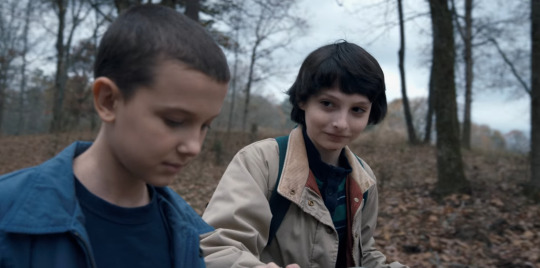

look. that's the same look. right?
let's take a closer look. to do that, i'm gonna have to zoom in a bit on the first one. because, as you can immediately see, the shots are slightly different. the first is a little farther away, showing both mike and el, walking next to each other, whereas the second is much more intimate, a closeup on mike's expression as he looks at will's face in the foreground. a minor but telling difference about the levels of emotional intimacy in each scene.
so, moving past that first element of contrast, let's look at each shot in full, because in both of these scenes, mike goes on a bit of a face journey before he gets to that final smiling expression, seen above.

personally, i think studying actors' body language and micro-expressions is inconclusive at best, but i won't deny that these look similar. however, it's pretty clear to me that they aren't the same.
toward el, i see confusion, intrigue, maybe pleasant surprise, followed by a glance down (to emotionally process and/or watch his step), and then a nervous but friendly smile.

toward will, i see awe, relief, and overwhelming affection, followed by a shy glance down and a slight schooling of his slack jawed expression into a warm smile.
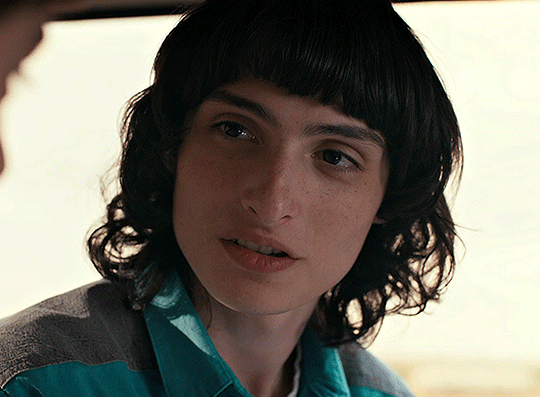
but, again, that's just my interpretation, and i can't say with any certainty what the intention of all of finn's micro-expressions are. but from my perspective, even a surface level viewing of these two expressions depicts a very different emotional experience. however: there's no denying the connection between these two scenes. they clearly mirror each other, just like a lot of things about mike's relationships with el and will mirror each other. i don't think that's an accident.
whatever you think his sexuality is, mike is undeniably in a romantic narrative with el. beginning in season one episode three, when the concept of their romantic relationship is introduced, the narrative arc mike and el share is heavily focused on that relationship. the first scene above actually happens in that same episode (s1e3), not coincidentally almost directly afterward. and the former scene, with mike, lucas, and dustin behind the baseball field, provides very interesting context for several reasons:
first: bear with me, because we're going back to look at the context behind this context. this is only episode three of the show, but already there's a lot going on, both in text and subtext.

and since we have the entirety of their relationship so far presented to us on screen, when lucas accuses mike of looking at el romantically, we're easily able to go back and figure out where he got that impression: we can examine every time lucas has seen mike look at el at all.
the first night, after finding el in the woods instead of will, and while insisting that the next day she'd be gone and they could focus on will again, mike's behavior is directly reminiscent of benny's. taking el in, and providing her with shelter, food, and clothing.
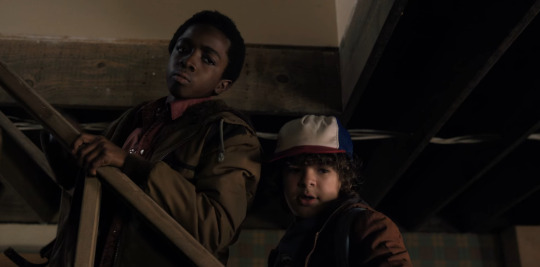
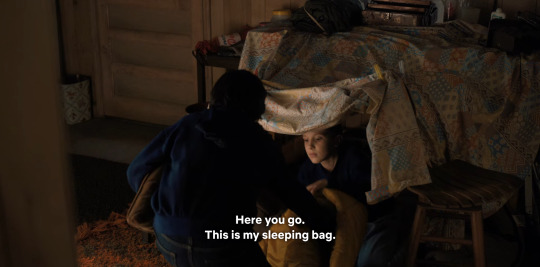
the next day, after learning that she's in danger and changing his mind about pawning her off on his mother, mike infers that she might know something about will. when lucas arrives, he exclaims that she recognized him and knew he was missing.
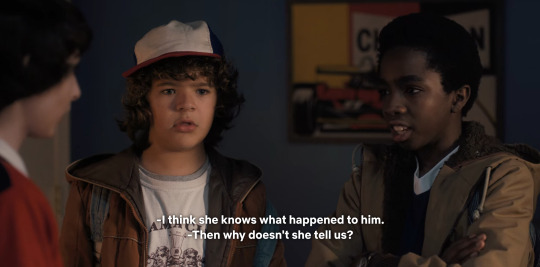
later, when lucas tells her that will is their friend, she asks what that means and mike explains. a friend...
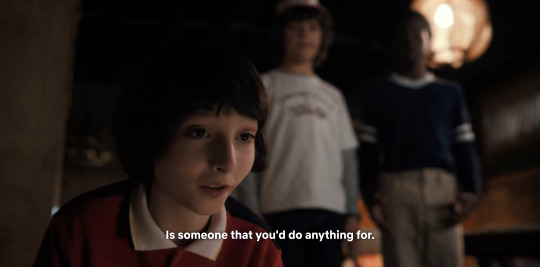
and then she displays that she might really be able to help them find will. and mike looks at her like this:
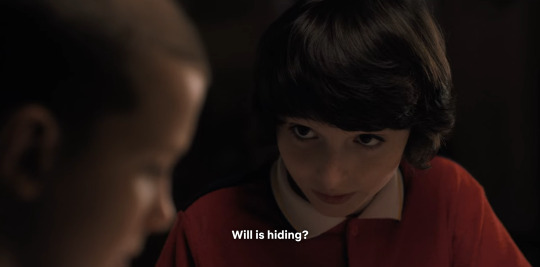
each and every one of these interactions is directly related to will. but lucas, through the omnipresent lens of heteronormativity that surrounds boys' interactions with girls (especially a group of boys who have no experience with girls... more on that in a bit), only seems to consider the fact that mike's behavior, which is undeniably about will, is being directed at el.
throughout season one (and beyond, in more subtle ways), will and el are repeatedly connected to each other through the trope of mistaken identity. will is abducted on the same night (and due to the same series of events) that el escapes the lab. hopper, in his investigation into will's disappearance, keeps running into clues about el. and mike, lucas, and dustin, sneaking out in episode one to search for will, find el instead.
later in the season, hopper eventually realizes the truth of his own more overt mistaken identity arc: while he was under the assumption that he'd been following will's trail, he'd actually been following el's. interestingly, the realization is triggered by one specific distinguishing difference, which tells him beyond a doubt that he's been looking for two different kids: their art.
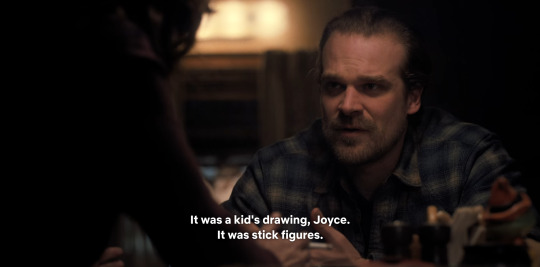
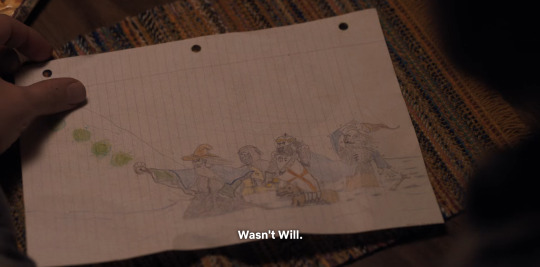
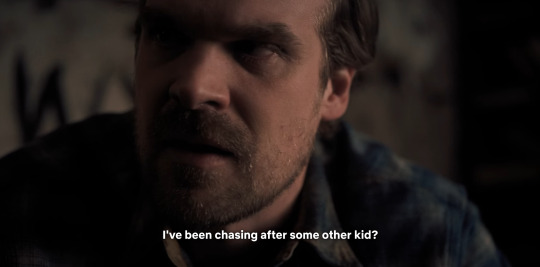
though much more subtle (aka hidden in the subtext), mike's arc with his feelings about will and el follows a very similar pattern. the main difference, though, is that in season one, the swapping of places is eventually reversed but never acknowledged as such, and mike ends season one with el now missing and will back in his life, but a lingering sense of something yet unresolved.
second: (i'm not going to deep dive into this one here, because it's a whole analysis in and of itself, but i need to mention it because it is relevant) this scene introduces the recurring motif of superheroes being directly connected to mike's feelings for el, which is an association we see follow them all the way into season four and become a defining metaphor for their incompatibility.

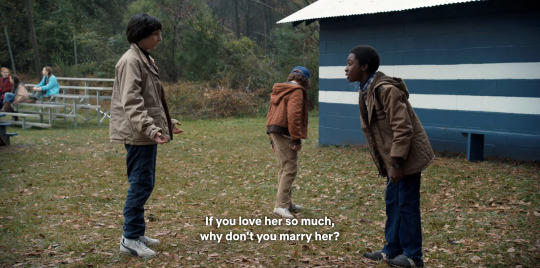
third: lucas is the character who first introduces mike's romantic feelings for el into the narrative. and instead of giving any indication that lucas' interpretation is correct, mike's reaction is... difficult to read. his response is immediately defensive, both verbally ("what are you talking about?" "shut up, lucas,") and physically (leaning away and shielding himself when lucas hugs him). we can infer from the original character descriptions why mike might be defensive about this subject:

obviously, this description is only a vague impression of what Mike Wheeler became, but it's clear that the core elements of his character outlined here did come to fruition on screen. here, mike's insecurity is linked both to the bullying he undergoes, and to his inexperience/ineptitude with girls. and it's presented as key to his character motivation (the original concept of his character arc put forth here is very straightforward: at the start, mike has insecurity centered around bullying and is romantically inexperienced. by the end, mike has courage against monsters and romantic experience.)
in any case, this scene is the first hint of this aspect of mike's character in the show itself (the earlier scene of bullying in the show focusing on mike consoling dustin over what he’s being bullied for (“i think it's kinda cool. it’s like you have superpowers or something!”)... see my last point here… mike holds the idea of superpowers in high regard, and they are consistently connected with his feelings about el. something about the mistaken identity through-line feels apt here: mike mistakes his feelings of admiration for el as feelings of romance.) in this scene, mike is confronted with both romance (in direct relation to himself for the first time in the show) and bullying.
but due to the way this is shot, it's impossible to get a read on what mike is truly feeling. it reminds me a lot of another scene, actually...

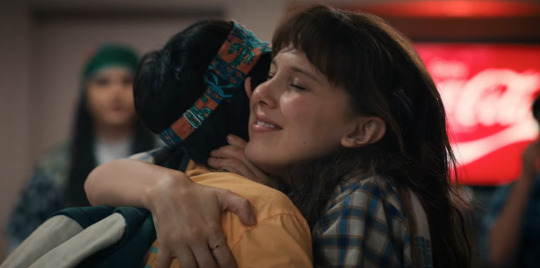
in both of these scenes, mike's genuine emotional reaction is hidden from us. in the first, lucas forcibly hugs him, teasing him about how much he "loves" el, and in effect introducing the idea of el as a romantic prospect to mike. in the second, el hugs mike tightly, her hand still around his neck from their kiss and his arm trapped in between them, similar to the way he shields himself from lucas. we're then shown that he's signed the card on the flowers squished between them "from, mike." hm. so... not love, as lucas suggests.
we come to learn over the course of season four that this is something mike is actively struggling with: his inability to "love" el in the way that she wants, expects, and deserves. this scene, introducing that season-long arc, conceals mike's true emotional state and motivations from us, again, mirroring the first introduction to their entire romantic plot line way back in season one.
(an aside: lucas' "if you love her so much, [then] why don't you marry her?" aka the inciting event of their romantic arc, is a based on a conditional statement with the hypothesis that mike loves el. as mr. clarke might posit (in, say, season one, episode one): what's the difference between an experiment and other forms of science investigation? ...well, an experiment is a controlled test of two or more variables against a hypothesis. does that remind you of anything happening in mike's romantic narrative? something about...... [murray voice] experimenting sexually?)
anyway. then, after extracting himself from el's embrace, mike finally drops his bag(gage) and opens his now empty arms to will, before preemptively cutting himself short with a punch to the shoulder.
...did someone say internalized homophobia?
and then immediately upon being introduced to argyle, mike is called out for his presentation here not being genuine. ("it's a shitty knock-off,"/"i really thought it was ocean pacific...") we're being told that something about mike's performance is not what it seems (and may even be a case of one thing being mistaken for something else).
and speaking of homophobia...
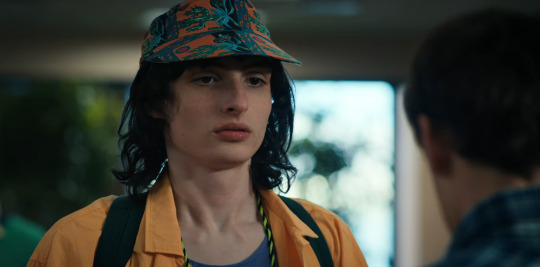
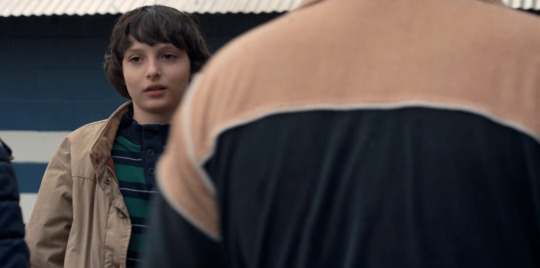
fourth (and finally): this scene, of lucas' teasing mike about his "love" for el, which i'll remind you again is tied directly to lucas mistaking mike's behavior regarding will as being solely about el, is quickly interrupted by an onslaught of homophobia, during which mike is specifically targeted (read: tripped) by the bullies.
the juxtaposition is immediate and obvious: mike's friends lovingly teasing him, even embracing him, over a crush on a girl vs. bullies maliciously taunting them about will being killed for being queer and then physically harming mike.
(there's also something to be said about the later scene in which these bullies force mike to drop his bike in the woods and chase him to the edge of the quarry, mirroring exactly how the cops assume will must have died... and, to be clear, i'm not saying that mike himself is being bullied for being queer in the way will was. no, mike's queerness is invisible to those around him in a way that will's isn't, so his relationship with it and the ways it affects him are hidden in subtext.)
which brings us directly to the following scene in the woods. el asks about mike's injury (sustained from the aforementioned bullying, thereby linking these two scenes even more concretely) and with a little prodding ("friends don't lie"), he opens up to her about what happened, and about being bullied at school. she listens, tells him she understands (this also follows her recent flashback of brenner's abuse in the lab), and they share a "cool," "cool," and a smile.
so... let's quickly jump over from here to the van scene with will. something similar, yet notably different, is happening in this scene, leading up to that infamous smile at the end. mike is sharing his insecurities with will now, but instead of will prodding him to open up, mike, prompted only by will's "she's gonna be okay," begins rambling so much about his insecurities (while speaking in superhero metaphors) that he eventually cuts himself off, saying it's "stupid." instead of letting him brush it off, will guesses exactly what mike is afraid of: "you're scared of losing her." he gives him The Painting (a symbol of his love for mike) and a long speech about feeling lost and different, while insisting upon mike's value (you're the heart, leading us, inspiring us, etc). and then they share a "yeah?" "yeah," and a smile.
so we can see the similarity in the way the shots are set up, the progression of the conversations, and mike's visible reactions. but we can also see distinct differences, all of which together inform a significant difference in emotional weight between these two scenes.
while mike's conversation in the woods with el takes place in the third episode of season one, at which point mike has known her for less than 48 hours, the van scene is in the second to last episode of season four, and is the fourth of five heart-to-hearts mike and will have this season alone (and following three previous seasons and beyond that years of close friendship). it is also arguably the climax of their shared arc this season. on the other hand, mike and el's season one moment is part of the introduction to their storyline, and the introduction to their romantic arc. in this moment in the woods, mike is looking at el romantically (did you think i was gonna argue that he isn't? because no, he definitely is). in fact, this is the beginning of mike's entire romantic arc, which sets out to address the foundational insecurity that is key to his character. we, as an audience, right alongside mike, have just been told (by lucas) that mike has romantic feelings for el. and then we are presented with this scene. we are supposed to view this as romantic. because mike is starting to view it as romantic.
had stranger things been one season long, then the climax of their romantic arc would have been the kiss they share in the cafeteria, followed by the denouement of el's symbolic death (the gay implications of which i could write another whole essay on...). but the end of season one was not the resolution of mike's full romantic arc. by the nature of the five act structure (which is what stranger things has, being five seasons), the entirety of season one serves as exposition for our full narrative. which means, in effect, that the entire arc of mike and el's season one relationship is there to serve as groundwork, a foundation for mike's complete five season arc. season one, starting from before he even meets el, all the way through to when he eventually kisses her and then loses her, is only act one of that arc. the first act of five act structure is when the driving conflict is presented. so in the context of the entire show, for us as the viewer, mike's narrative arc surrounding the romantic aspect of his insecurity begins with his season one "romance" with el.
and we know that this insecurity is an element of the full five-act narrative, rather than being presented and wrapped in the course of the mini "self contained" narrative of season one, because we can see plainly, three seasons later, particularly during mike's heart-to-hearts with will, that this insecurity has not yet been resolved. we know this, on a basic level, from having watched mike and el's relationship struggles progress, but it is still explicitly laid out for us in season four. and will is consistently the only person who genuinely hears mike out, encourages him to open up, and addresses his insecurities, instead of brushing him off, like most other people in his life (including will at some points) have done. will understands him in a way el only claimed to in season one.
looking back to the character outline: mike has now "kiss[ed] a girl" and even "had a girlfriend" and still hasn't resolved his insecurities even remotely. in fact, after the first season arc wraps up, this romantic relationship becomes the main source of that insecurity. his difficulty navigating a real romantic relationship with el is the basis of their arc in season three. and by season four, mike is consciously struggling with being unable to tell el that he loves her. despite will's reassurances that things will be okay (which stack onto lucas' constant relationship advice in season three), mike keeps circling back around to it. because he can't move forward on the path he is on.
he has reached a point of no return, like a “fight you can’t come back from.” he is unable to find the security he is searching for in his romantic relationship with el... and this is where we arrive back at the van scene with will.
if the scene in the woods marks the beginning of the introduction of mike's romantic arc, then the scene in the van marks the beginning of the conclusion of mike's romantic arc. if the introduction of his romantic arc (season one) presents his insecurity, then the natural conclusion of that arc (season five) is security. throughout season four, mike lays out for will the insecurity that his relationship with el still brings him. he is unable to find that security with el, and, in the van scene, finds it with will instead.
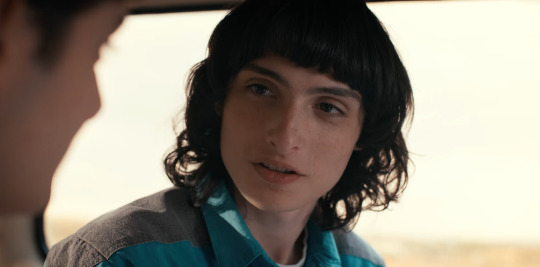
or, should i say, begins the journey to finding it. because, especially after the lie that brings them into that moment, and then traumatic pizza dough freezer incident, we're still at the beginning of the conclusion. there's still a lot to resolve, but season four (alongside mike, who now understands what he's been going through) finally began moving the subtext of mike's arc into the actual text. and this moment indicates that season five will take that next step to fully, textually, actualizing it.
so, getting back to the parallel we're looking at here: each of these scenes is a catalyzing moment in mike's romantic arc. in season one, when lucas suggests that mike has a crush on el, and then what follows is a conversation with el where she is (to quote lucas) "not grossed out" by him, he actively begins his journey toward resolving this character motivating insecurity. he looks at el and he sees the possibility of romance.
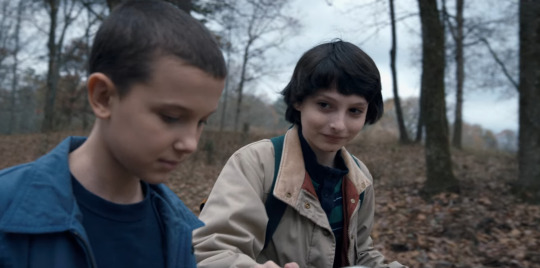
and just look at him. he looks excited. hopeful. a little nervous. but... i want to remind you again: mike has known el for less than 48 hours at this point. this is the first conversation they've had in which they've related to each other as equals. for their entire relationship before this and afterward, outside of their romantic interactions (and also. often. disturbingly. concurrent with their romantic interactions...), mike's role has been as el's protector, a makeshift father figure, the elliot to her E.T. here, though, el tells mike that she understands him.
in season one, mike is twelve years old (read: pre-pubescent). he has no personal understanding of or experience with romance. dustin starts to comment in s1e2, "you're letting a girl...?" and ted later scoffs "our son with a girl?" and outside of the queer coding, what we can take from both of these (which draw back to the original character description) is that mike has no experience with girls whatsoever. (outside of, you know. family. but that's not what this post is about.)
and again, this scene happens almost directly after lucas first introduces the idea of romance between them, both to the narrative, and to mike himself, who, very significantly, up until this point, has shown no romantic interest in el. the sequence of these events is not a coincidence. 1. lucas assumes mike has romantic feelings for el. 2. el and mike have a moment of personal connection and understanding 3. mike "boys only" wheeler puts these two together and assumes the connection between them must be romance. but the expression on mike's face here isn't a representation of already existing romantic feelings. there's no basis for those. again, this moment represents for mike the potential for romance.
which... makes his expression in the van scene hit even harder. because unlike el, will isn't a stranger he barely knows, but rather his best friend of ten years. and it isn't lucas telling mike how mike feels. it's will professing his own feelings about mike, in direct response to mike's self-professed insecurities. (ding ding ding, are your alarm bells going off?) mike's expression at the end of this scene, if we're viewing it as a reprise of his season one expression, is a representation of hope for his romantic future. but this time, heading into the resolution of mike's romantic arc, with all of the knowledge and context we (and mike) have gained over the course of the past four seasons, it's directed at will.
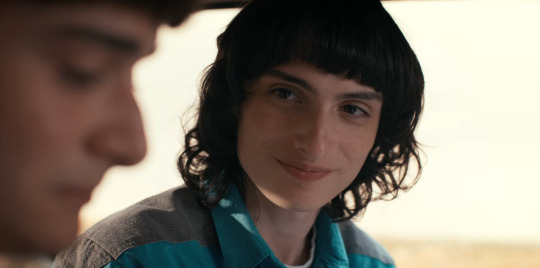
ok. so. with the basic connection between these two scenes established, i'm gonna move a little bit sideways here. at the end of their romantic arc in season one, el disappears from mike's life and will reappears in it, effectively swapping their places (remember that we've been dealing with the mistaken identity trope between these two), and leaving the question of mike's romantic security glaringly unresolved.
and we know why - this is a five act narrative we're watching - but just within the context of the season one arc... the climactic moment of mike finally asking the girl to be his sister kissing the girl was preceded by her locating will in the upside down (leading to his rescue) and followed by a resolution in which she disappeared... and will took her place. at the end of the season, mike is left in the same place he started: playing games in his basement with will, his first attempt to resolve his arc of romantic insecurity, with el, ultimately ending in tragedy.
after season one, this arc picks up again, but this time will is the one present in mike's life. and mike's behaviors toward el in season one, during which they were undergoing a romantic story arc, begin showing up again in his behavior toward will. but unlike with el, mike's particular (read: romantic) behavior toward will happens without outside intervention, and in fact, often in spite of outside intervention. now, this isn't to say that all of mike's behavior with el was a result of others' influence. when el reveals to mike that she is on the run from "bad people," mike is immediately protective and caring toward her. however, as i've already explained, this caring behavior (which, again, we know right off the bat is not romantic because it directly mirrors the way both benny and hopper care for her) doesn't turn into romantic behavior until lucas introduces that idea.
on the opposite side of the spectrum, right from episode one of season one, mike's behavior toward will is fully self motivated, even in the face of opposition.
and as we move through season one and beyond, we can see that mike continues to rely on constant guidance in the way he cares about el (particularly and most consistently from lucas).
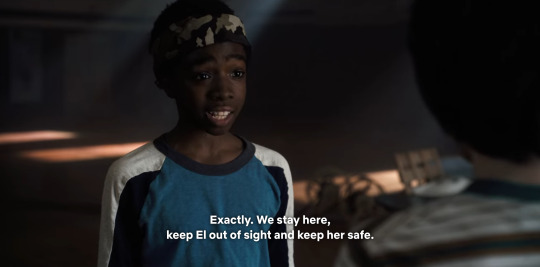


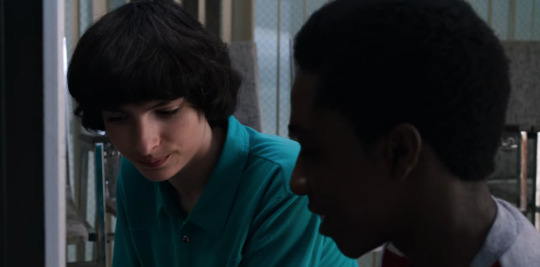
stranger things is, at it's horror filled core, a coming of age tale. like many of our other characters, mike's full character arc, romantic and otherwise, is about self-actualization. from the very conception of the show, his insecurity is presented as a central character flaw to overcome, while also being directly linked with his romantic fulfillment. the overcoming of this fatal flaw, the resolution of his romantic arc, and his final achievement of self-actualization are all inextricably intertwined.
the reprisal of this specific expression of romantic hope as we enter the end of mike's romantic arc is not an indication that mike is in the same place emotionally at the end of season four as he was at the beginning of season one, just with a different person now. instead, it is an indication of his romantic arc coming full circle. mike began in a position of hope for his romantic future with el, only to have the actualization of that hope (their romantic relationship) gradually degrade his romantic fulfillment and self-esteem. the longer mike and el are together, and the more serious their romantic relationship becomes, the worse mike's insecurities become. this is, i would argue, directly related to the fact that mike's pursuit of a romantic relationship with el is not due to his own genuine desire, but instead a combined result of heteronormativity (lucas assuming mike's feelings for el to be romantic), compulsive heterosexuality (mike's subsequent assumption that his feelings for el must be romantic), forced conformity (mike's attempt to resolve his insecurities firmly within these heteronormative boundaries, under the assumption that a rejection of these boundaries is unacceptable), and the trope of mistaken identity that has been following will and el since season one.
and of course i don't know with any concrete certainty what season five will contain, but based on the narrative so far, and optimistically expecting a satisfying resolution to his character arc, the actualization of his romantic hope regarding will is going to lead to true romantic fulfillment and coincide with his self-actualization (a big part of which is coming to terms with his sexuality).
now, i'm not going to conclude this whole analysis by saying, "and that's why mike is gay!" because while i think this all is a good indication of that, based on all of the context and my impression that this narrative is being presented in a way that focuses on the subtext and deeper symbolism of each of these relationships rather than being a case of specifically el vs. will, you might still have a different interpretation than me. that's fine. however, i am going to end by insisting (me when i argue with the wall), based on everything i've laid out, that this parallel and others like it (ie parallels between byler & miIeven's romantic arcs) are not evidence of mike's feelings, specifically whether they are genuinely romantic or not. this parallel serves as a narrative device in his romantic character arc... the conclusion of which is mike realizing and coming to terms with the fact that he is actually in love with will, and not el.
just to be very clear, i'm not saying these parallels alone are proof against mike being bisexual, but i am saying that they are not evidence in support of his being bisexual. again: they do not indicate that mike is romantically attracted to el. what they indicate is that will and el are foils in mike's romantic arc.
before i finish, i want to address a couple misconceptions:
1. the fact that mike actively and willingly participates in a romantic relationship with a woman means he can’t be gay. this is straight up homophobia. gold star bullshit. no.
2. mike and el being presented in a romantic light means that they have genuine romantic feelings for each other. this is a misconception of the way narrative tools are used to tell a story. going right back to my first point: it is an irrefutable fact that many gay people have romantic relationships with the people of different genders (read “the opposite sex”) before they come out/realize their true sexuality. it is also a fact that many of these gay people fully believe their feelings to be genuinely romantic before realizing that they are not. as i've already gone over, mike is twelve years old when his romantic arc begins. on the surface, his relationship with el is presented as romantic. he participates in (and even initiates) romantic behaviors because he believes that his feelings for el are romantic. in seasons one and two, mike is one of our main POV characters. we can see a romantic tilt to the way some of their scenes are shot because, to mike, while they are happening, they are romantic (keeping in mind what i said before about mike having no experience and therefore no personal knowledge informing his perspective, AND keeping in mind that many of these on-the-surface "romantic" scenes are also consistently subtextually linked (read: paralleled) to familial relationships for both of them... and i haven't even touched the cultural context surrounding homosexuality in 80's. there's so much nuance informing the way this story is being told). and we, as the audience, are supposed to read them as romantic on first viewing, because otherwise the season five plot twist, revealing the truth of mike's feelings, would not work.
it is not a coincidence that the active degradation of their romantic relationship (outside of all of the other context, parallels, symbolism, family coding, etc, that are there to hint along the way that things are not as they might seem) begins full force in season three, at the exact point when the two actually enter a real relationship for the first time, and also when our characters are entering puberty, the time during which a person's sexuality (in a general sense, but also in regard to sexual orientation) begins to fully emerge. after his season one arc with el, mike underwent another season-long romantic arc: this time, with will. it's more subtle, because (i believe) mike doesn't realize yet that it's romantic, but it's there. then at the end of season two, mike makes a choice: he encourages will to dance with a girl and he dances with el, re-writing their tragic ending from season one, but now leaving his romantic arc with will frustratingly unresolved, again mirroring the sense of unresolution from season one: mike has swapped out the end of each romantic arc with the wrong love interest.
and then in season three, now having had the experience of both romantic arcs, and now, for the first time, with both will and el right there beside him, all we can see anymore is the overt contrast between the two relationships, depicted most blatantly through the same type of visual and narrative "parallel" we've been looking at here.
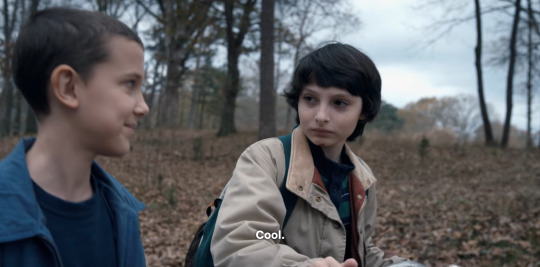
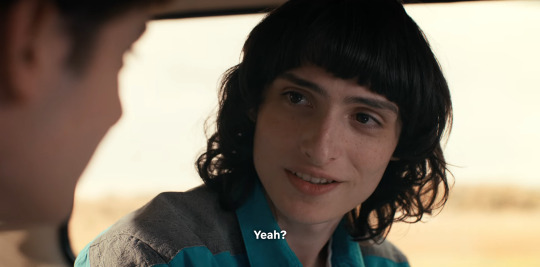
but at the end of this season, instead of making a choice, mike's choice is made for him. he has a romantic moment with will, and then el kisses him, confusing the resolution of these two romantic arcs once again.
mike's season four arc closely mirrors his season one arc (searching for one love interest with the other by his side, mistaken identity trope abound), but with important distinctions: 1. mike is a little older, a lot more experienced, and has a better understanding of both the context of romantic relationships and the scope of his feelings for both el and will. and 2. mike's only real guidance in season four comes from will, and he doesn't simply listen and act based on will's advice, as he did with lucas' in seasons 1&3. now, he fully engages with will's input, pushing back against it when he doesn't agree, and accepting it when he can acknowledge its truth (up until, of course, our fourth (and hopefully final) tragic, incorrectly resolved ending). mike is finally taking control of his romantic narrative in a way he hasn't previously, and the direction it's heading in now is toward security, self-actualization, and will.
so the point of all of this is: nothing is as simple or straightforward as it may seem on the surface. the narrative has always been deeply complex and layered with subtext and symbolism. and most of all, when interpreting the meaning of anything presented directly to us on screen, context matters.
also uh. yeah, mike gay
#byler#mikesbasementbeets posts#parallels are there to be noticed. but that should be where the analysis begins. not where it ends.#this got kinda long i just wanted to be really thorough bc this kind of 'parallel = 1:1 similarity' thinking is way too prevalent#this is less an analysis and more me explaining the plot of the show but. sometimes it feels like it needs to be explained lmao#yes i lied about the ending but when you eliminate the only claim negating that conclusion....#that's. i mean that's the conclusion.#(btw the difference between comparative and experimental investigations is that in an experiment one of the variables is fixed.#something to think about)#mike wheeler
927 notes
·
View notes
Text
The Chosen One's actions in Animator vs. Animation 11: A Mini Analysis
Recently, with the release of the latest Animator vs. Animation episode, I have seen many people begin to view Chosen's character in a more negative light. Now I can't lie and say that this episode doesn't exactly do him any favors, however I think people need to hold their horses a bit when it comes to assuming how he actually feels about the Newgrounds rampage.
First off, the big one, Mitsi's death. Chosen is framed to have been the one who killed her, and it's clear that Agent, and the narrative, believe it was him who did it. But if there's anything I've learned about red herrings, it's the fact that what seems like the obvious answer might not be so obvious after all. We don't actually know if Chosen was the one who killed her, all we see is a a flurry of fireballs raining from the sky, one of which hits Mitsi and completely incinerates her, then we see Chosen flying down from above. Considering that Dark is also shown to have flown in from above, it could've just as easily been him who killed her.
As a matter of fact, Dark would probably make more sense seeing as his most common form of attack is fireballs. Regardless of who did it or not, I do think it's important to remember that Chosen isn't the only culprit and that we shouldn't immediately assume it was him.
But let's say, for a moment, that Chosen was the one who did it, I still don't think that frames him in as negative of a light as the fandom portrays.
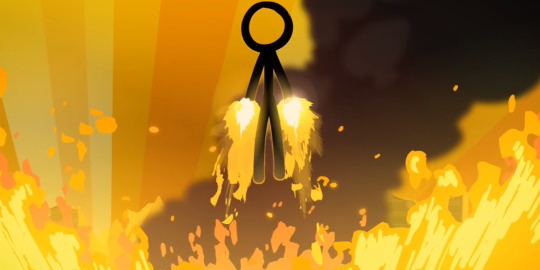
For starters I should say that we don't know how Chosen feels about what he has just done, at least not in this episode. However we see the exact same Newgrounds rampage from his perspective in Season 2, and there it's pretty clear that this is the point where he starts having second thoughts, and his body language in this episode actually reflects this.
When we first see him, Chosen is just sort of... calmly descending upon the destruction, there's no indication of what emotions he is feeling at this moment, but I honestly don't look at this and see "yeah, he definitely enjoys this"
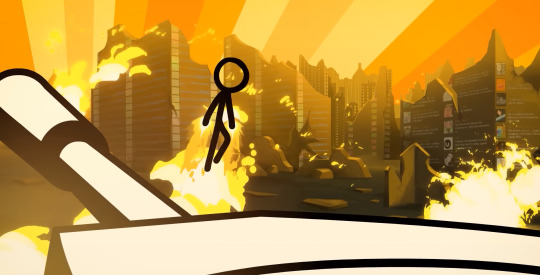
His movements are slow and non-aggressive, there's no real energy in his actions, no sign of pride or enjoyment, he just sort of flies over the the Newgrounds tank and lands on top of it. To me this doesn't come off as someone who is enjoying this, this is coming off as someone who is taking in all the destruction around him and simply trying to process it. It's not positive, nor is it negative.
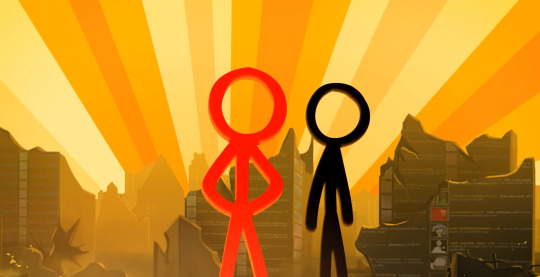
But I think the most telling thing about it is how his body language contrasts Dark, take a look at this shot. Notice anything?
For one, Dark is centered while Chosen is the one standing off to the side, portraying him as almost a secondary threat, a person standing alongside his much worse partner.
Moreso than this however, look at their poses. Dark has his hands on his hips, clearly taking pride in his much destruction he and Chosen have caused. Chosen by comparison is just sort of... standing there, there is no clear show of pride in his posture, as a matter of fact, this shot here almost reminds me of this one.
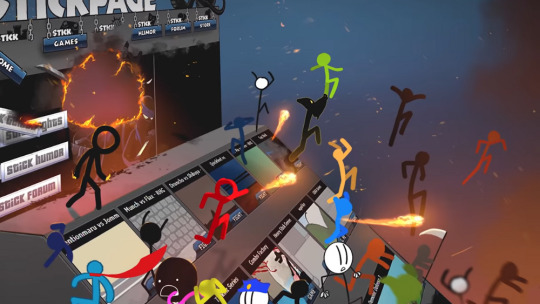
In both cases, Chosen is seen off to the side, staring down at the destruction while not showing any real emotion, and in this case, it was clearly trying to communicate that Chosen was not enjoying this as much as Dark was.
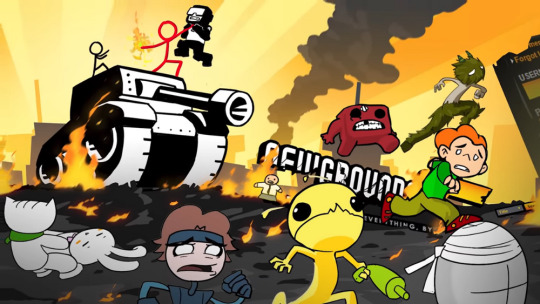
He's even seen seemingly pleading with Dark to stop what he is doing, and you wanna know something really interesting about this shot?
Chosen and Dark are both shown on top of a tank, just like we saw in AvA 11. I'm not saying this is the same scene, but I am saying that the parallels here are likely not meant to be a coincidence. In both cases Dark is clearly taking pride in the destruction, Chosen meanwhile looks a lot more unsure.
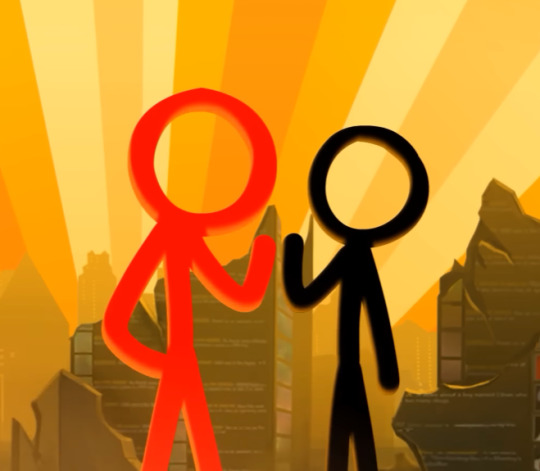
Now for the high-five scene. People have already pointed this out but Chosen almost seems to hesitate before giving Dark a high-five, as if he's unsure about it.
Another detail I also wanted to bring attention to is how Dark initiates the high-five. It may seem small at first until you remember that this isn't the first time we have seen such a gesture between the two characters.
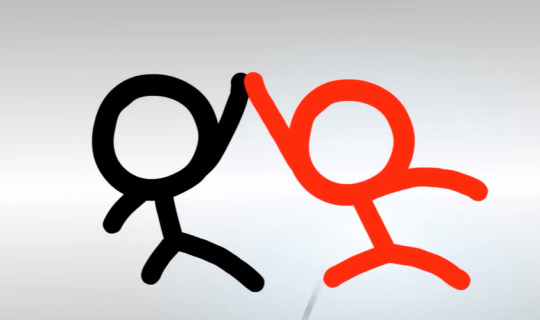
We all see this happen in The Flashback, and ya wanna know the interesting thing? Chosen was the one who initiated it. Keep in mind that the context of this seen was that Chosen finally escaped Alan's abuse and was clearly happy about it. It should also be worth noting that unlike Chosen, who took a few seconds to reciprocate the high-five in AvA 11, Dark does it almost instantly.
This is all to say, while this episode does not portray Chosen in the most favorable light, I don't think this is as simple as "he killed Mitsi and enjoyed it".
I want to make it clear that I do not think Chosen is innocent in this scenario, whether he enjoyed it or not, he still actively took part in this rampage, all I'm saying is that we don't really know Chosen's feelings during this moment or if he was even the one who killed Mitsi in the first place, and with how he was previously portrayed during this exact same rampage, I have more reason to believe that he didn't actually enjoy this at all. So before you raise your pitchforks and call Chosen the worst person ever, consider that maybe, there is more nuance to this story than first meets the eye.
233 notes
·
View notes
Text
I am so tired of all this discourse about s8 and Sam's actions at the beginning. Because there are only two types of people. The first ones hate Sam, blame him for everything and, to be honest, I can completely understand them (I am a Samgirl myself). The second ones justify him and all his actions and for them he is white and fluffy, he did everything right.
For me, all this is nonsense and an example of how people don't know how to think wider. And it's not about some deep analysis of the character (although, of course, this is welcome), not about trying to understand whether he did right or wrong. But the fact that in general the entire beginning of the s8 is complete nonsense. And it's not about the characters, but about the script.
Yes, I think that the blame here should be shifted to the writers.
You need to understand that in a show like Supernatural there is a HUGE number of writers. Each episode is written by a separate person. And each of these writers feels, sees and understands (or doesn't understand) the character differently. And if during the series it's not so noticeable, because small things can be different. And the fact that after the fifth season we are shown very little about the characters themselves, and not about the global plot, only helps to blur this difference. Then the end of the s7 and the beginning of the s8 stand out from the general picture too much.
The writers were in a hurry. The writers needed to somehow develop the line they went along and create a conflict. And the situation was such that... there was nothing to create a conflict from. Because, looking at the development of Sam as a character all this time, the viewer understands that he, just like Dean, would do everything possible to find his brother. Those who refer to their agreement "not to look for each other" probably forgot the beginning of the fourth season, where we were clearly shown that Sam absolutely goes crazy when Dean is in danger or dead. And it would be one thing if we were shown that Sam really changed his point of view. But no, there was no development in that direction. The only thing we were shown was that Sam wants to be more independent. And this is a normal, correct desire (especially in their relationships). But NOTHING told us that he can just… forget about it. Just do nothing. Just not look for Dean. Like can you imagine that this lore freak wouldn't look for any information about what happened to Dean? They tried to make a parallel with the beginning of season six, but they didn't understand that the situation is FUNDAMENTALLY different.
Because later, in season nine, Sam changes AGAIN. He is ready to do anything for Dean again, he goes crazy again when he dies, he is ready to destroy everything in his path and sacrifice everything in order to get his brother back to him.
Then what was the beginning of season eight for? Why were we shown this? Why did Sam suddenly become a bastard then? Because of a woman? No, because the writers needed a conflict between the brothers. And they decided to do it at Sam's expense, because guess what? In this show, everything is always at his expense.
For me, their meeting in the first episode is just another proof. They haven't seen each other for a year, Sam doesn't know what happened to Dean, Dean doesn't know what's going on in the world after the Leviathans were left without a leader. But how do they greet each other? Dryly, unsentimentally, as if they haven't seen each other for only a week. Their meetings were brighter even after they haven't seen each other for a couple of hours on another case. Honestly, I think even Jensen and Jared didn't like playing this, so tasteless it was.
I don't deny that Sam could have lived a normal life this year. But only after he broke down from ignorance, after he made every effort to find out something, after he realized that he couldn't help in any way. And only then, after he can accept it, he would have hit that damn dog.
And all this is not the character's fault. It is the fault of the writers, who have given up on all the logic of Sam's development and have not found another way to implement their ideas. In addition, the further we go, the clearer it becomes that they are doing this not only with him. Only Dean remains more or less stable, the other characters change almost beyond recognition with each new season (just look at Cas' entire storyline).
I think it's just dumb to put the blame on the character here. Because if you love Sam and follow his development, you'll understand that this whole situation is completely out of his character. Not to mention Kevin, who Sam would NEVER leave alone after all they went through.
So, yeah. The writers of beginning of s8 sucks. That's all.
#I'm so tired of pretending that all this crap is totally canon#cause it's not even one or two times when writers just forget about some stuff#and it's almost always happens to my Sammy#sam winchester#dean winchester#supernatural#spn
36 notes
·
View notes
Text
Golden Hour: Part 2 Analysis Bonus: Where Do We Come From? What Are We? Where Are We Going?
Sorry for the long title but this was just the perfect opportunity to use my favourite art piece title of all times (even though I hate Gauguin's style). As you can understand from the title, I will discuss the parallels and juxtapositions between each protagonist's character in the start and as of Golden Hour: Part 2. This doesn't further my theories in any way and I'm doing this solely because I think it's fun to notice and compare these. If you want to see the previous posts of this series you can find them below:
Part I: The Diaries
Part II: "Ice On My Teeth" MV
Part III: The Chess Piece Theory
Hongjoong: Captain had started this journey with the main intention of getting on TV and finding his family. In the process, he used music and dance as a tool for his goal and created himself a new family thanks to this. In the end he did get on the TV and found the family he was looking for, even though he strayed away from music and dance and did this through literature. But now the family he created is scattered across the world with separate lives, barely ever communicating, just like his biological family was. Get one, lose one I guess.
Seonghwa: In the beginning Seonghwa was sick and tired of all the routine and to-do lists. The thing that triggered his attraction to art was actually how free the dancing girl seemed. However, he found solace in emergency training when he was working through the traumas of World Z. I don't know if you've ever had any emergency training, but they are basically to-do lists that you must memorize so well that you can execute them flawlessly without thinking. The thing that basically freed Seonghwa from his own mind was routine and to-do lists. In fact, he found this more comforting than vague dreams. This also manifests itself in The World diaries too since Seonghwa was the planner of the group. Maybe the road to freedom wasn't getting out of the routine, it was just planning with a goal in mind.
Yunho: Yunho's trigger was his brother's death and most of his arc was about grief and moving on. However, Yunho very clearly doesn't move on. He becomes an archaeologist after seeing another Cromer in hopes of finding more artifacts and going back to his dangerous yet glorious life in World Z. Or to take back the time and go back to save his brother again. As far as we can see, he is the only member who chooses a path in life with the direct goal of going back. Furthermore, as an archaeologist his job and lifestyle is about dead people and their lives, which becomes a bit meaningful considering his brother's death. I'm sorry if this last part sounds insensitive, I literally cannot find a way to mention this sensitively.
Yeosang: I find his character development the most interesting actually. First of all, it was never about music at all when it comes to Yeosang. He was already playing music; in fact, he was forced to play it. What drew him to the group was escaping expectations. However, at the end of the day, he plays right into them. He becomes an investor just like his father (I imagine, but he may have a different job related to finance too). He tries to prove to himself that he is different by financing arts but in the end he is the one to tell Wooyoung that he should not try again because a life that doesn't follow his first passion is not a failure and is good enough. Rather aggressively. He reminds me of a father who is concerned that his son will doom himself to failure by taking the risk of becoming an artist and wants him to just settle with a normal job. Very much like his own father.
San: In the first Fever diaries, San's big issue was moving around too fast to form meaningful relationships. He was basically being dragged around by his family. And then he decided to stay at one place where he formed them. And when everyone started moving on he realised staying at one place was not the key to this: it was what you make of the relationships you form in the limited time you have. So he starts moving around to create new relationships and experiences; because life is about sharing love, eating together, and cleaning up after your own messes. And he wants to share love and eat together with many people. He still does the same thing he used to hate when he was young, but this time he does it with his own consent and moves only when he is ready. I think it was always about consent with San: the difference between exploring and not being dragged around.
Mingi: There is a crazy juxtaposition between Mingi's poverty when he was young and his extreme wealth now. When he was young he was basically a ghost because of his social and economical status and was only noticed when he was about to be bullied, except for Wooyoung. Now he is the talk of the world and is highly praised.
Wooyoung: I am looking through the notes I took while going through each diary entry ever as I write this and I realized something: I didn't write anything about Wooyoung. Because Wooyoung is the only stagnant character. His wishes don't change, nor does his humour. And the only reason I can find for this is he is the only character who didn't manage to move even one inch to his dream, he wanted to become a dancer and he still isn't a dancer. And he isn't the type to settle too, he is an artist through and through.
Jongho: When we first meet him he was clinging on to music and becoming an idol after his dream of becoming a basketball player had failed. Now his dream of becoming an idol is through too and he is settle with just being a producer. He still believes the opportunity will present itself but let's be honest, at 24 (I take irl Jongho's age for the character's age, check Part I for explanation) it is basically impossible to become an idol with no previous media exposure. I think becoming a producer and vocal coach for new groups and trainees because you weren't picked as an idol is very similar to becoming a basketball coach because you couldn't make it as a player. Jongho can never achieve his full dream, he always has to settle.

What Is Their True Passion?
As I was writing this I realized something: The only members who pursued music/dancing for music/dancing's own sake were Wooyoung and Jongho. For all else it was just a tool to achieve what they were missing. Hongjoong used it to become famous and reunite with his family, Seonghwa did it because of the feeling of freedom and beauty it provided, Yunho only got interested because he wanted to fulfill his brother's dream despite his life being cut short, Yeosang wasn't even scouted because he was an artist but because of his engineering and accepted the group's offer because it was the only place he felt he could live up to expectations (manning drones is a fulfillable expectation for him), San was in for the stable relationships he could finally form and Mingi was mainly into music because it was a way for him to escape his reality.
We see all these members achieve their goals in the end: HJ finds his family, SH feels free one way or another, Yeosang can live up to the expectations of him becoming a successful investor, San is forming bonds his way and Mingi is no longer struggling financially so he has nothing to run away from. Yunho still hasn't achieved dream but has found a way that doesn't involve art.
We can clearly see for any of these guys it was never about art at all so they have an easier time moving on from this phase. Wooyoung and Jongho, however, are the only ones who actually did art for art's sake and in the diary they are the only ones who are serious about trying again. However Jongho is the kind of person to settle with "good enough", he likes his peace more than making his true dream come true (and who can blame him for that?) while Wooyoung will do whatever it takes to achieve his first dream, because it is his only dream. That is why Yeosang's words don't make sense to him and seem cowardly. This is where the controversy is: he can't understand the others because he doesn't know what their real goals were and the others cannot understand him because for them art was never the thing they were really chasing after so accepting to pursue another dream isn't that hard.
So clearly, when Wooyoung wishes to reignite a passion he doesn't specify, there are a wide range of passions that can be reignited within the group. And I am so curious to see how events will unfold following the latest diary. Thanks for coming to my TED talk <3
#ateez#ateez lore#ateez theory#atz#iomt#ice on my teeth#golden hour#golden hour part 2#GH:2#kim hongjoong#park seonghwa#jeong yunho#kang yeosang#choi san#song mingi#jung wooyoung#choi jongho#kpop#kpop theories#kpop bg
17 notes
·
View notes
Text
Revisiting the Rat Cook, Part 1: The Best Pie, and Lord Lamprey
This is the first part of a series I've been sitting on for a while, where I'm going to examine the symbols and themes present in the "Rat Cook" story, as relayed by Bran in ASOS Bran IV, and search reappearances of those elements throughout the rest of ASOIAF.
This series is predicated on the understanding that these books are rich with intentional symbolism, metaphor, and allegory, and that the repetition of these symbols and themes adds to their meaning.
In general, the symbols that are present in ASOIAF are limited by their ability to be inserted into the plot of the story (i.e. if the symbol of a stag killing a direwolf is important, there must be a way in which the characters are able to encounter such a scene within the plot's context). However, the metadiegetic legends that exist in-world for the characters of ASOIAF are not beholden to the same restrictions, and because GRRM is able to invent these myths in their entirety without restrictions on any of the individual symbolic elements, we can trust that each separate element of these in-world myths was placed intentionally.
With that in mind, I believe we can use stories like that of the Rat Cook as a sort of "road map" when looking at the reappearance of these same symbols and themes elsewhere in the story; I believe the "Rat Cook" story is the most distilled example of these elements. I don't mean to say that every instance of "rats" references the Rat Cook directly, but that the Rat Cook story provides a place where Martin is able to use these symbols in their most abstract form and describe their relationship to each other, so that when we see them appear again elsewhere in ASOIAF we might better understand what we are being shown.
So, among other things, the Rat Cook story is about a rat which eats rats, or a cook who serves kings; The Rat Cook story is about fathers and sons, about cannibalism, about trust, about vengeance, and about damning one's legacy.
This is likely going to be a 9-part series, but ideally almost all of these parts will be able to stand on their own. Each post will inform the next as I build my analysis, but hopefully each individual post is also interesting in its own right.
RtRC Part 1: "The Best Pie You Have Ever Tasted" and "Lord Lamprey"
This opening part, for better or worse, is going to retread some well-discussed ground: the clear parallels between the "Rat Cook" story and the incident in which Lord Manderly serves certain overlarge pies in ADWD The Prince of Winterfell, a scene lovingly dubbed "Frey Pie". However, as well-established as this comparison is, I want to begin here so I can begin to introduce how a closer analysis of the Rat Cook themes are present in this uncontroversially parallel scene, and how they might add more depth to interpreting that moment.
Not only does the scene evoke the same imagery, serving pie to the Lords amidst conspicuously missing sons, but the connection becomes even more direct when Wyman Manderly looks directly to the camera and says, “Hey reader, if you’re wondering where those Freys are, think back to any scary stories you know about pie”.
Okay, he doesn’t actually say that, but it’s close enough, and as much of a nudge we’re like to get from Martin (and which still went over my head on my first read through). Instead he does the next best thing, cueing Abel to sing while staggering past our POV:
"We should have a song about the Rat Cook," he was muttering, as he staggered past Theon, leaning on his knights. "Singer, give us a song about the Rat Cook."
Manderly seems to acknowledge the similarities himself, and most have noticed as well.
However, making the comparison between the story of the Rat Cook and Manderly’s actions is particularly interesting in their differences.
There are many ways in which Manderly’s pies, as a mirror, are appropriately an inversion of certain elements in the Rat Cook myth.
Returning to the scene as we see it in ADWD The Prince of Winterfell:
“Ramsay hacked off slices with his falchion and Wyman Manderly himself served, presenting the first steaming portions to Roose Bolton and his fat Frey wife, the next to Ser Hosteen and Ser Aenys, the sons of Walder Frey. "The best pie you have ever tasted, my lords," the fat lord declared. "Wash it down with Arbor gold and savor every bite. I know I shall." “True to his word, Manderly devoured six portions, two from each of the three pies, smacking his lips and slapping his belly and stuffing himself until the front of his tunic was half-brown with gravy stains and his beard was flecked with crumbs of crust.”
Manderly takes on only some of the roles of the Rat Cook here. Despite his status as lord, he plays the role of the humble cook, personally serving Roose Bolton, Walda Bolton (née Frey), Hosteen Frey, and Aenys Frey, all standing in for the “Andal King”. In this way, the role of “Andal King” as someone who has official power and the role of “Rat Cook” as effectively powerless dissident are played out straightforwardly. Bolton and his allies are backed by their army and the authority of the crown while Manderly has no official backing of his own.
Wyman even physically resembles the Rat Cook; Wyman’s blue eyes indicate he is presumably pale, and Wyman is prodigiously large, to mimic the descriptor of “white, and almost as huge as a sow”.
However, like the “Andal King” himself, who had a “second slice” of his own son, it is Wyman Manderly, and not Bolton nor the Freys, who devours two portions from each of the pies. In this way, the roles have elements which are interchangeable.
Wyman is acting out both roles, which is especially interesting because in this comparison is a single most definitive contrast: The Rat Cook, most notably, is not punished for serving the pie, as "a man has a right to vengeance". Instead, he is punished for violating guest right.
Now, Wyman—who lost his son to the Freys at the Red Wedding—certainly has a “right to vengeance”, but betraying guest right is something which Wyman Manderly takes great pains not to do. Manderly conspicuously notes that he gave the three dead Freys guest gifts upon their parting, marking them as no longer guests under his roof, and subsequently, theoretically, freeing him to kill them. Manderly introduces the idea while Davos marks the distinction for the reader’s sake in ADWD Davos IV:
“The Freys came here by sea. They have no horses with them, so I shall present each of them with a palfrey as a guest gift. Do hosts still give guest gifts in the south?" "Some do, my lord. On the day their guest departs.”
The Freys, on the other hand, as executors of the Red Wedding, are the most notable violators of guest right, while the Boltons contributed their part as well; both are being punished for that sin by Manderly-the-Rat-Cook here, marking the inversion of the story. In this iteration, the party serving the pie seems to warrant no judgment; instead, the pie itself is the judgment, served as retribution. With that connection in mind, it's worth remembering the other importance of the Rat Cook story, based on its placement in ASOS and which I think has often been overshadowed by Manderly’s “Frey Pies” incident.
In the Rat Cook story, after the Rat Cook's punishment, he spends an immortal future forever eating his own descendants, a scenario in which Bran describes the rats of the Nightfort as “children running from their father”. That eternal, kin- and legacy- devouring doom does not just come secondary to the punishment, it is a part of the punishment following the violation of guest right, and introduces the notion of an entire family being cursed for that violation... and, for good measure, is brought up in ASOS Bran IV, chapter that occurs only a few chapters after the Red Wedding itself.
In one respect, this is just another reinforcement for the reader of the sanctity of guest right and of the laws of the old gods. Coming so soon after the Red Wedding, the Rat Cook story hints at the fall of House Frey. Walder Frey, most culpable violator of guest right, has apparently doomed the rest of his dynasty to death, punished for his actions, the way that the Rat Cook, too, is a patriarch who creates not only his own ruin but also the ruin of his progeny. Although Walder himself is not literally tying the nooses, it is Walder who has metaphorically become the father "devouring his children" indirectly through his ruthlessness. Wyman Manderly, then, is merely an agent of that doom.
On the subject of the Freys being cursed by violating guest right, only one of the named consumers of the pie, Aenys Frey, is truly mirroring the Rat Cook legend by literally eating his own son, Rhaegar Frey. Both Aenys and Hosteen Frey, on the other hand, are specifically called out in the scene as being the “sons of Walder Frey”. It’s appropriate within the mirrored Rat Cook motif to invoke Walder’s name as patriarch as well as the promise of other “sons” that might succumb to their father’s insatiable appetite for status; this sentence invokes the dynasty of the Frey household. Indeed, Walder Frey himself also has shared motifs with the Rat Cook: like the immortal Rat Cook, Walder Frey has nearly innumerable children and grandchildren, and he too seems to refuse to die.
If a named heir in Westeros is like the ASOIAF version of Chekov’s gun, then the Late Walder Frey is sitting on Chekov’s arsenal; once he becomes the late Late Lord Frey, it’s going to explode. If that happens in an upcoming book, then the Rat Cook story might be setting up the idea of how an eventual succession crisis of House Frey might further this metaphorical connection, with this doomed family turning on itself, each running from the shadow of their father’s legacy like the Rat Cook's children run from him in the Nightfort.
Lord Lamprey
Now, to push through a little more symbolic linking between the Frey Pie scene and Lord Manderly:
If we consider the “pie” element as a key part of the Rat Cook story, then seeing a “pie” specifically in the hands of Wyman Manderly prompts a connection with a noted favorite of Manderly’s: lamprey pie. As early as ACOK Bran II, we learn that:
“His own people mock him as Lord Lamprey”,
Interestingly, we see in that same chapter a telling metaphor considering Manderly and lampreys not in a pie:
“Lord Wyman attacked a steaming plate of lampreys as if they were an enemy host”.
Considering Wyman’s lampreys-as-enemy association makes for curious contrast later, in ADWD Davos IV, as Manderly is feigning allegiance with the hated Freys. Here, Manderly has just stepped away from the feast in order to secretly treat with Davos, and the food served may contain more meaning than at first appears:
“In the Merman's Court they are eating lamprey pie and venison with roasted chestnuts. Wynafryd is dancing with the Frey she is to marry. The other Freys are raising cups of wine to toast our friendship.”
The reappearance of this noted lamprey pie might take on more significance knowing that some of those eating it become a pie later on. The reminder of the association between Manderly and his lamprey pies seems even more intentional when the “Lord Lamprey” nickname conspicuously returns as Bolton’s men search for the missing Freys in ADWD Reek III:
"You did not find our missing Freys." The way Roose Bolton said it, it was more a statement than a question. "We rode back to where Lord Lamprey claims they parted ways, but the girls could not find a trail."
Invoking his nickname in this scene draws a connecting line between Manderly’s favorite pie, the “enemy host” of lampreys, the missing Freys, and “lamprey pie” being served as a symbol of the fake “friendship” between the Freys and Manderlys.
If that Frey-Manderly friendship is marked by mentions of lamprey pie, and Manderly loves to eat lamprey like he would eat an enemy, and we see in The Prince of Winterfell that Manderly apparently loves to eat his enemies, having two portions of each Frey pie, we might think that the Freys are being paralleled with Manderly’s favorite pie filling: lampreys. If that is the case, then comparing the punished Freys to lampreys is a scathingly fitting image, and I mean that literally.
Considering that carnivorous lampreys latch onto fishes to slowly eat the fish’s blood and flesh while the fish still swims, then looking at an image like this makes for some serious symbolic resonance if you consider the Tullys as fish (as they often are described) and the pie-filling Freys as pie-filling lampreys. It certainly provides a strong visual metaphor for the Frey’s “late” and half-hearted vassalage to Hoster Tully, how they dealt with Catelyn, and how they are now parasitically using Edmure—he sits in Riverrun at the end of ADWD, but with Freys latched onto him, bleeding him like they did his family.
This series is otherwise about pies and rats, not lampreys, but I will mention a few other interesting associations with lampreys that are worth looking into. The Stokeworths, when they are desperately trying to secure a match for Lollys, serve each of their prospective suitors lamprey pie, perhaps a signaling of the Stokeworth’s parasitic place at court, or the attitude towards their search for their daughter’s match. Note that in that context, Littlefinger remarks that he loves lamprey pie, perhaps fittingly for someone who has risen high by making use of his parasitic attachments to those more powerful. By contrast, when our intrepid advocate for truth and justice—Davos—is jailed after his return from the Battle of the Blackwater, he is served lamprey pie in the dungeons, but finds it “too rich” to eat. We have already seen that Davos has no stomach for the blind flattery that some of Stannis’ other lords have, and this scene describes that same character trait. I believe there are even further associations that are worth investigating, but for the sake of this essay, we must move on and end here for now.
In the next part, I'll focus on how it's relevant that the Rat Cook's pie and Manderly's pie were both allegedly "pork" pies, and where that reappears as well.
#asoiaf#a song of ice and fire#rat cook#asoiaf theories#literature analysis#wyman manderly#walder frey#RtRC
81 notes
·
View notes
Text
GWitch Onscreen Text: Episode 17 PART 2: DUEL
Greetings and Salutations! This is part 19 of my attempt to catalogue and discuss the onscreen text on monitors and screens in G Witch, as well as discuss other interesting things. This is Part 2 of Episode 17, covering the parallels to season 1 in Suletta and Guel's Duel in the latter half of the episode.
<< Click here to return to PART 1 Click here to go to the Masterpost!
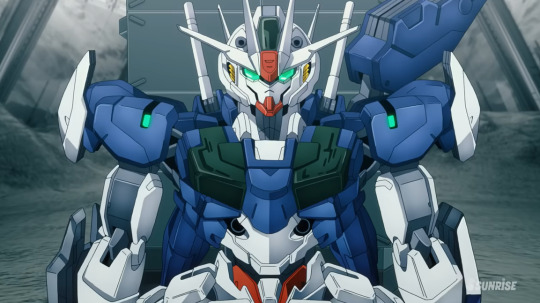
Episode Analysis is never decided by the quality of an episode alone. Nor by the skill of the analyst alone.
The Result is the only truth.
PREFACE:
For the sake of simplifying things when drawing parallels, please keep in mind these shorthands:
Duel 1 (D1) will refer to Guel and Suletta's first duel in Episode 1. Duel 2 (D2) will refer to Guel and Suletta's rematch in Episode 3. Duel 3 (D3) will refer to Guel and Suletta's third duel in THIS episode.
Now let us begin.
DUEL

When the duel starts, the framing of Secelia's "Fix Release" is similar to Shaddiq's in D1, and El4n's in D2. Though, for some reason, hers is lit more brightly.
An interesting thing about this duel is that it's the only duel in the series where the Committee Member who officiated the Dueling Oath is NOT the same as the Member who Observes the corresponding duel.
Suletta v. Guel (D2) was officiated and Observed by El4n. Guel v. Elan and Elan v. Suletta were both officiated and Observed by Shaddiq. Miorine v. Shaddiq was officiated and Observed by Lauda.
But Suletta v. Guel (D3) was officiated by Rouji('s HARO), and Observed by Secelia. Not a parallel, but isn't it interesting?

The Duel's first parallel shows up early on. When Guel closes the distance on Suletta, who's firing at him, he disappears into a cloud of dust, only for Suletta to realize she hit his shield and not his mobile suit, proclaiming, "A shield?" (Left) This is a callback to Duel 1, where Lauda exclaimed the same thing when Suletta blocked Guel's shots with the GUND-Bit Shield. (Right)

After Guel tries to swing his blade at the AERIAL and hesitates after seeing a flashback to the fight with his father, he doesn't end up swinging, but instantly draws out his gun, only to hesitate again, unable to pull the trigger. This is the exact same thing he did during that previous fight, down to the motion of the gun and the twitching of his finger.
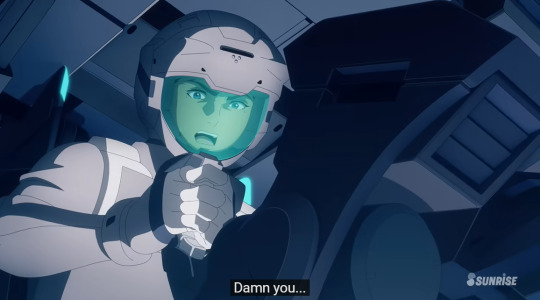
It's why he grabs it and says, "Damn you..." because he's repeating that same behavior.
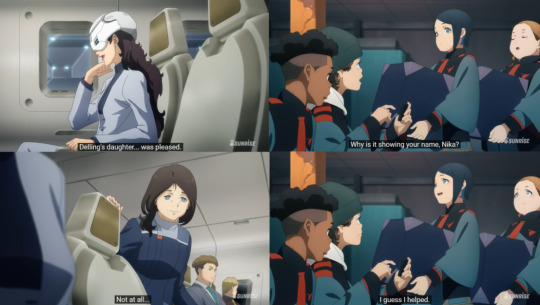
After this, we see a scene where Prospera thanks Bel for her help with the duel. This is paralleling Duel 1. If you remember, Suletta only won that duel because Nika interfered, allowing Suletta to enter the Tactical Testing Sector and getting to Aerial by using her notebook.
Now, Duel 3 is going to be lost due to Bel's interference, and her role in (presumably) helping Miorine program the remote shutdown on the Victory Charm. Both duels even have a scene where their role in it is pointed out by someone.
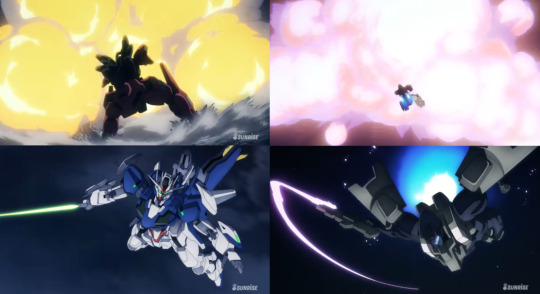
This parallel to the Jeturk fight is pointed out within the episode itself, but you might not have noticed that it wasn't just Suletta pulling out the sword that was similar, the explosion of the Darilbalde's pods was also an allusion to that moment.
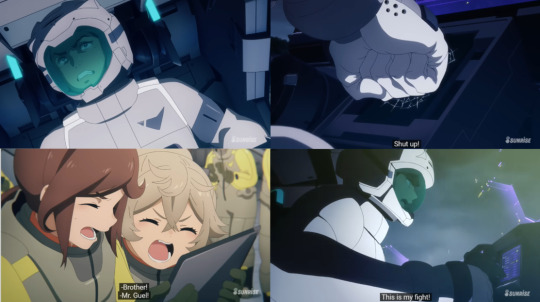
This next scene is also a parallel to Duel 2. (Right) During that Duel, when Guel is talking to his father, he demands to know why his father won't believe in him, and his father responds, "Why don't you understand this duel is bigger than you? Children should do as their parents say!" Only for Guel to snap, smashing his notebook and disabling the AI, proceeding to finish the fight on his own. He shouts, "This is my fight! It's mine! Only mine!" as he rushes Suletta.
In Duel 3, Guel is paralyzed with fear in the face of his traumatic memories. He's frozen, unable to move, but it's only the shouts of encouragement from his brother, Petra, Felsi, and all of Jeturk house that snaps him from that daze and spurs him into action. This battle is not for him alone. It belongs to him, and everyone behind him.
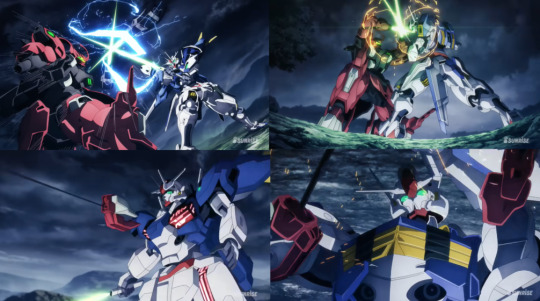
Both Duels even follow up their respective scene with Guel defending from Suletta's sword swing with his Beam Drones, and follows that up by attaching his shackle claws to Aerial's shoulders.
The BGM that plays during this penultimate scene is also different in their respective duels. In Duel 2 (Right) the song that plays is, unsurprisingly, The Witch from Mercury.
youtube
But in Duel 3 (Left), the song that plays is Weapons Should Only Exist to Kill People.
youtube

After that big attack, Guel looks down at the control panel and says, "This thing..." (Right) in reaction to the assistance he received from the AI. This is a parallel to his reaction in Duel 2 (Left), where he said the same thing. In that duel, he was fighting against the AI, but in Duel 3, he's embracing it, and working together with it has improved the ability of the Darilbalde significantly.
I also like to believe that, before in Duel 2, the Autopilot moved without his command, leading him to say, "This thing..." in annoyance. But in Duel 3, the Darilbalde didn't move to defend against Suletta's attack UNTIL Guel moved it first. I think he was surprised about that.
In Duel 2, Aerial's Right arm is severed from its body, but in Duel 3, it's reversed, and it's left arm has been severed.
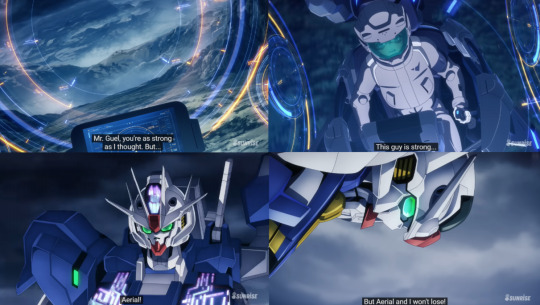
And then, in the climactic moment of the fight, Suletta affirms Guel's strength, but says that she won't lose. (Left) Just as she did in Duel 2 (Right).
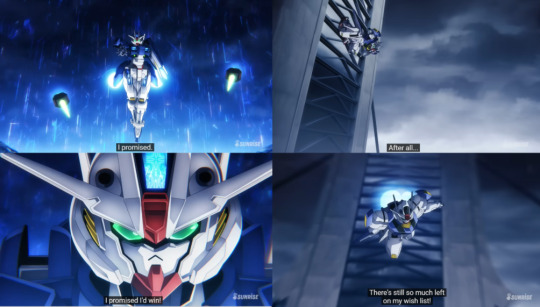
She explains why she can't lose. In Duel 2 (Right), it was because "There's still so much left on my wish list." But in Duel 3 (Left), the reason has changed. It's because She promised. She promised Miorine she would win. So they could buy rings, wear pretty dresses, and have a beautiful wedding.

It's easy to miss, but Miorine's hands are shaking here, and she's hesitating to activate the shutdown function.

As Suletta proposes to Miorine, and asks her to choose her, she starts charging the GUND-Bit Canon (Left). Considering it's raw power and strength, even at it's lowest output settings as we see in episode 12 (Right), it's probably not unreasonable to assume that if she had released this charge, she might have fatally injured Guel.
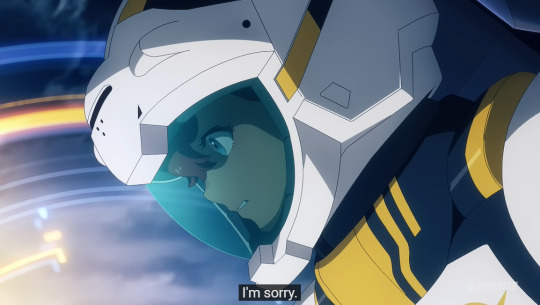
Eri apologizes to Suletta. Now that she's reached Permet 8, she can fully control her body. Even if Miorine hadn't forced a shutdown, she probably would have deactivated on her own accord.
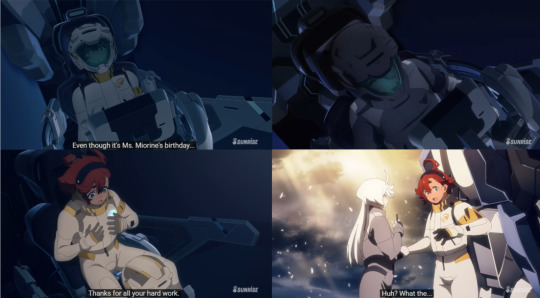
During the final scene, it parallels Duel 1. The shot as a whole is similar to the scene in Duel 1 where Suletta opens Aerial's cockpit door to take Aerial back from Miorine (Top Right). Only now, Miorine has appeared to take Aerial away from her.
Miorine takes the Holder colors from her, (Bottom Left) just as she first bestowed them upon her at the end of Duel 1 (Bottom Right)
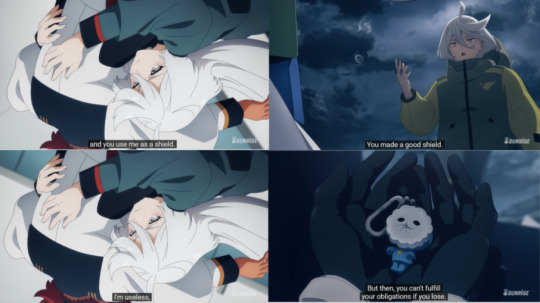
She takes it all back. Everything that she'd said, everything that they'd been, and realizes Suletta's worst fears from Episode 11.


Nice to meet you, my groom.
Goodbye, my Mercurian country bumpkin.

You might have noticed, but all 3 of Suletta and Guel's duels take place in dark, overcast environments. In Duel 1 (Left), when Suletta wins, intense, golden rays cut through the cloudy sky.
In Duel 2 (Middle), when Suletta wins, the light is less vibrant, but it still shines through, mixing with the squall of the sprinklers to create a beautiful rainbow.
In Duel 3 (Right), when Suletta loses, there is no light.
And just as in Duel 1, the scene fades out into the credits.
And with that, it's over.
Click here to go to Episode 18 >> Click here to go to the Masterpost.
20 notes
·
View notes
Note
Do you think part of the reason why Ruby was so upset at Blake and Yang in particular isn’t because she’s genuinely mad they got together (or homophobic as I’ve seen some people joke) but because she’s /jealous/ that they were able to take enough time for themselves to even think about their own personal relationship, when meanwhile Ruby has been fighting for her life since the end of volume 3? Like maybe Ruby would love to stop and talk to her friends and sister about her potential love interests (as a girl her age should get the chance to) but she doesn’t have /time/, and seeing Yang and Blake kiss just made her realize what she’s been denying herself in order to be the Heroic Leader. idk I’m in my rosegarden feels and I bet watching Yang and Blake be so close just makes her feel more alone than ever.
LMAO I'VE SEEN THE HOMOPHOBIC JOKES 🤣🤣 how anyone actually believes that allegation is very funny. But yeah I agree. Since the very beginning of the show, Ruby has just wanted to be a normal girl with normal knees who can "paint her nails, try on clothes, and talk about cute boys" with her friends (Note: Oscar has been called cute twice already in show). And Ruby has not had the chance to do so at all because she hasn't stopped moving. Even leading up to v9, everyone else had other things they were focusing on and she's just been trying to hold everybody up. Never taking time for herself to sort out her own struggles. So she's feeling alone and left behind. I went over it a bit in the Treasure Analysis about the framing at the end of v9e6 where the Bees are warm and cozy by the fire, Weiss is warm with her cup of tea, and Ruby is sitting cold by herself by the window across from an empty chair. All alone in crowded rooms without the one person that makes her not feel that way.
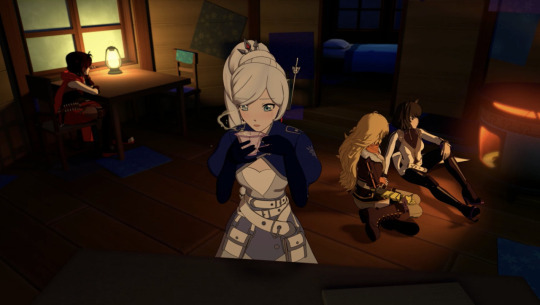
The volume starting with Oscar as the very first illusion that Neo uses - and RG being the only pair that was split up in v8 that didn't end up reunited in v9 - sets up his absence very strongly right out the gate. And that absence just seems to grow with each episode.

As much as I do love RG, I don't know that Ruby necessarily knows she likes Oscar or has reached that point. At least not yet, but distance makes the heart grow fonder (as we have seen with Renora and the Bees) and I have a feeling we're not ready for how close they're going to end up when everyone is back in Vacuo.
Part of her upset here in the Ever After, is that she is crushed under the weight of so many things that she doesn't even have time to entertain such an idea as a crush. In any other circumstance, Ruby would have been elated about so much of what they're experiencing. She would have been excited for the bees just like she had been in v6 and she would have been all over this fairytale nonsense in the Ever After.
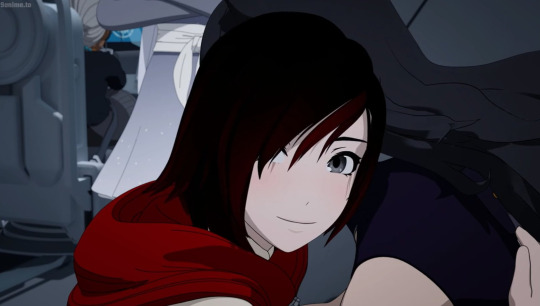
But she's tired. Weiss is snapping at her every other hour, Jaune is a broken husk of himself and needs their help more than he can offer it in return, and the Bees got to spend time sorting out their feelings and find comfort and support in each other... while Ruby is just dealing with all of this on her own.


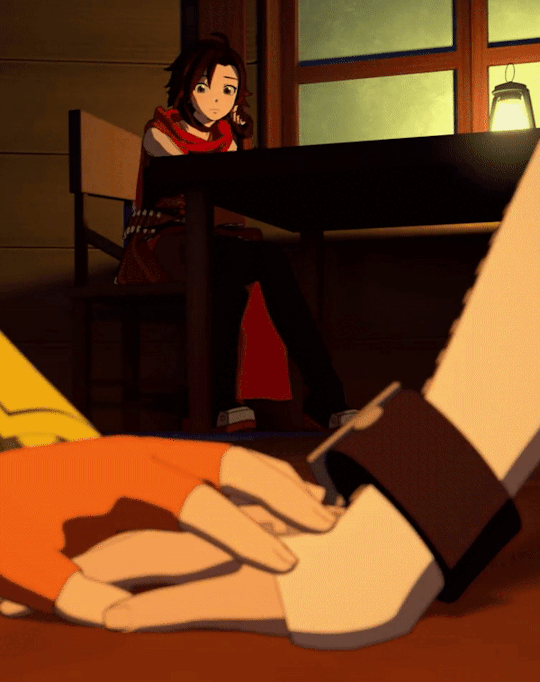
She doesn't feel seen. She doesn't feel wanted. She doesn't feel prioritized. The only person that ever asked 'what about Ruby' is in another dimension and the only one in Ever After that noticed before she broke was Little (who has VERY STRONG PARALLELS to Oscar as I just brought up in a recent ask).
This volume is very rough emotionally on our characters, but I'm really optimistic for Vacuo being an arc of resting, rebuilding, and recovering for all of them. But especially for Ruby. Because there ain't no way all of what was brought up this last episode can be resolved in the 3 we have left until the season is over. But at least Oscar is waiting for her with open arms once she gets there. 🌲💕
#sorry for rambling again!!!#there are fictional characters in my head#asks#ask#clashingharmony#chainalysis#rwby#rosegarden
118 notes
·
View notes
Text
Wonderful hats! Jack's is very nice, so is Irene's from what I can tell (I look forward to being able to see it better, which will probably happen? Who knows. Nice hat. Solid feather.), and I love the bit at the end where Jack is handing Griffin (who has the same outfit as him, excepting a few bandages) a hat. (More on that under the readmore.)
Secondly, Arthur and Jack having matching outfits is delightful. I'm getting this out of the way first thing because it's much shorter than the rest of what I'm probably going to write.
And now we get to the bit that made me decide to write this as an actual post. There's been some analysis of the outfits already in the comments:—


—and it poked my brain into informing me that Jack and Griffin had loads of parallels besides the outfit.
Jack and Griffin's outfits kind of parallel their positions in Dracula and LXGF respectively. First of all, I should establish what those positions are. (Oh god this is my essaywriting process. And I'm actually writing all of it out.)
Jack, in Dracula, was the character who neglected his own health the most,* to the point that it led to injury to other people. His story between about the middle of Dracula and the beginning of LXGF seems to have been him accepting the love of the people around him and gradually becoming healthier, recovering not only from the events of the novel but also from his preexisting damaging mindset.
(Oh good, we're not to the batshit part where I need to argue this is symbolized by the hat.)
* Obligatory note that Lucy is also very bad about this, as is Mrs. Westenra to a lesser extent.
Griffin, at this point in LXGF, is somewhat similar. (Disclaimer that I haven't read The Invisible Man yet, so I can't authoritatively comment on his story there.) As Jonathan puts it, Griffin when we meet him "look[s] days from death." He's living in an abandoned building, believing (accurately) that the only way to keep himself safe from other people is to stay out of their notice. He's gotten some sort of illness that may well kill him and his first scene ends with him fainting. (To be fair, I too would faint if I were invisible and a man with white-glowing eyes nonchalantly mentioned that he could see me.)
Then he's taken in by the future League (I think it's fair to call them that) and treated well, which he doesn't expect. He's unchained, sheltered from Kemp, and actually given a meal when he wants one, all of which surprise him. He's still standoffish (refusing pain medication out of fear of being drugged; also fair, considering he doesn't know these people), but opens up somewhat (willingly answering their questions and even volunteering information).
Then, after it's made clear he's not a prisoner, he chooses to stay with the League and helps them set up their trap for the king. Also notable on the second page linked there is his reaction to having his ideas met positively. He reflexively tries to appear nonchalant, but quickly caves and asks, "I mean... you really think so?" He's warming up and being warmed up to in turn and experiencing connection.
That's the recap up to now: nineteenth-century up-to-date with a vengeance.
Now for this page. (This page—! I'm shaking it between my teeth.)
Jack and Griffin have similar outfits, which represents their similar initial positions. The main difference (besides, of course, Griffin's invisibility) is that Jack, who has already recovered, has a hat.
This hat (and now we're in the batshit part) is the love and acceptance he's found within the Drac Attack Pack.
Early on in Dracula, when he proposed to Lucy, he wore a silk hat that he very nearly sat on. Based on my (admittedly very fast) research and the Dracula fandom zeitgeist,* this was likely a top hat of some sort. Top hats are very stiff in form and do not recover well from being awkwardly sat on. (Neither do felt fedoras, and they're much more soft-sided; I speak from personal experience on that one.)
* which is valid to cite in this post since the writers were almost certainly influenced by it, LXGF having come about in the wake of Dracula Daily and all
But the hat that he's wearing now is (something I've tentatively identified as) a newsboy cap, which is as soft-sided as you can get and would survive being sat on well.
Silk top hats seem, based on some admittedly brief research, to have been the (or a) societally-accepted gentlemen's hat of the period (Wikipedia; photograph of important event), so they (in the context of LXGF's newsboy cap) represent Jack's attempts early in the novel at conformance to societal norms, even to his own detriment.
Here, he has a soft hat, which is perhaps not quite in keeping with fashion (I may be wrong about this; please let me know if I am), but which is adapted to him as a person and will not be damaged by a failure to conform (or to avoid sitting on his hat).
That's why I believe it represents the love and acceptance Jack has found in the wake of the novel.
And now that he's been picked up by the League, Griffin is experiencing some of that same love and acceptance.
Jack, who has been in a position like his but survived and surmounted it, is the one to offer him the hat, completing the outfit (and protecting him from discovery in a way that is also symbolic of the prevention-of-harm aspect of a good support network).
...
Well done, my hat's off to the writers.


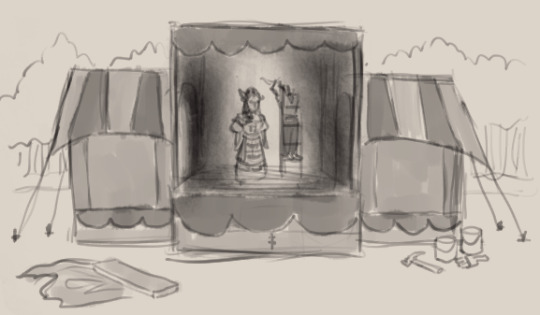


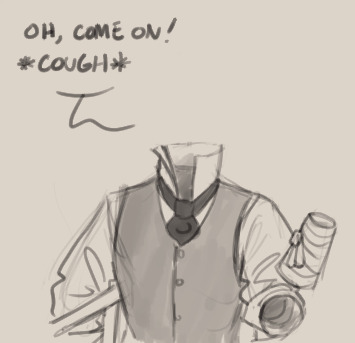

First page || Previous page || Next page
Dialogue transcripts:
Panel 1 Irene: I hope this works… Griffin: It’ll be fine, I’m sure.
Panel 2 Griffin (offscreen): Lights!
Panel 3 (n/a)
Panel 4 Griffin: How’s it look?
Panel 5 Jack: Impressive. Convincing. Now, it’s back to the house with you.
Panel 6 Griffin: Oh, come on! *cough*
Panel 7 Jack: I mean it. Griffin: He bit me! Twice! *cough* By rights I ought to— Jack: —Be resting. Now hurry up, before someone sees you.
#analysis#lxgf ashley griffin#lxgf jack seward#lxgf#pun intended#I reread the whole of lxgf for this lmao
297 notes
·
View notes
Text
AN ISWM ANALYSIS: THE LAMENT OF THE ACTOR
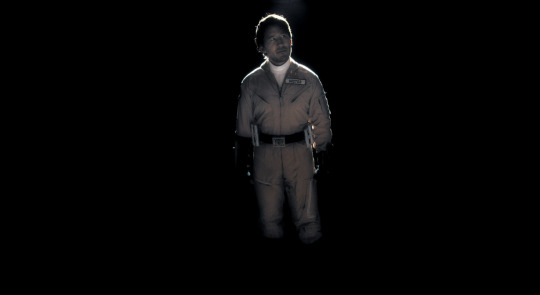
AUTHORS NOTE:
THIS FAN ANALYSIS WILL CONTAIN HEAVY SPOILERS FOR IN SPACE WITH MARKIPLIER (PT. 1 & 2). IF YOU HAVE NOT WATCHED THOSE, PLEASE STOP READING AND GO WATCH THEM, WHAT ARE YOU DOING? If you don’t wish to be spoiled, turn back now! This is your last chance! Go on, Get out of here, go!
Or don’t. It’s your choice after all. But at least now, you know the consequences of your decisions.
For those continuing onward, buckle up for a long one. I loved In Space with Markiplier so deeply, and it resonated so strongly with me, and also with Mark’s other creative works. The man is nothing if not a master of parallels. Grab a snack, and maybe some water. THIS IS 5k WORDS AND A LOT OF PICTURES. YOU HAVE BEEN WARNED.
It’s time… for the End.
ACT I: THE MAN AND THE MIRROR

Actor Mark.
We know him. We hate him. We adore him. We abhor him. He is a man we’ve come to realize, collectively, is the one who is behind all of the stories we, the viewer (the DA), go on. This has been apparent since at least DAMIEN, where Actor confesses to making these worlds and putting the ‘other prisoners’ of the house through his stories. It puts Wilford Mother Loving Warfstache into a more contextual light, and also, frames the narrative to his other stories to come.
The biggest, most important part about Mark though, is that he is a man of grief. And once he realized he couldn’t die while in his house, he turned that immense power of creativity into a means of escapism. Escapism from all his problems, all his loss, all his petty mistakes that cost the lives of his friends. He could make everything beautiful again! He could replay the dream, over and over and over again, because that’s all this was, right?
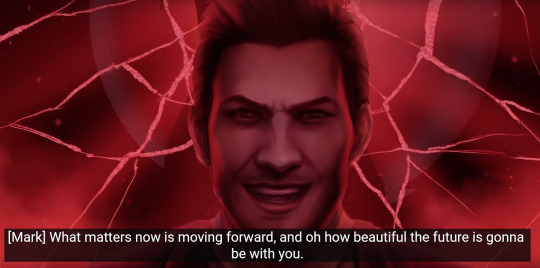
Mark is in a house, with an unlimited lifespan, choosing to make stories where he can move forward and make a beautiful world, a beautiful future. He’s there with Celine, with Damien, with Abe and Wil and then… there’s… us.
The District Attorney. The person who can’t remember who we are and we are constantly put to sleep, just to wake up into a new story every single time with Mark. We go on a Heist with Mark, we go on a Date with Mark. We meet friends, we meet figures who look familiar, and we see a few faces that, tickle our deja vu, who seem to tell us, ‘you know me, you should see me, you are stuck in his stories’ . Darkiplier, the merging of Celine and Damien’s worst qualities into our body, constantly tries to remind us of the horrible things our ‘dear friend Mark’ has done, tries to get us to see. But he can’t tell, if we are awake or still dreaming. Do we even know what’s going on? Surely you must… surely we’ve seen through his mask by now.
But we haven’t. Not until we go to Space. And not until we start to question things, we start to notice the boat is leaking, and everything, everything starts to fall apart.
Let’s take a Detour really quickly.
This will be quick, I promise. It won’t take long. But I want everyone to think, for a moment, back to Wilford MotherLoving Warfstache. Still, in my opinion, one of the greatest things Mark has ever created. As a standalone, and as a side piece to WKM, it is incredible, astounding. And he had the audacity to directly link it to In Space with Markiplier.
This is important. We’re getting there. You see, understanding Space is a bit like understanding what happens in WMLW. In it, Abe the detective is playing his role, and he plays it well. And finally, he gets to the point where he re-finds Wilford, who he’s been hunting for killing him and his friends and his partner. Abe believes the problem is Wilford and is hunting him down to solve those issues.

He’s determined, he’s the cop. He’s the good guy hunting down a bad guy. He finds Wilford in a disco. Everything goes according to plan.
Except, of course, when it doesn’t.

Abe sees Wilford, talks to him, and then suddenly begins to question everything he has believed up until that point. The smoking gun of this moment is when Wil doesn’t immediately recognize Abe, and Abe questions how this could possibly be. In doing so, a second Wilford appears, realizes he’s in frame, and then as Abe gets back into character, that Wilford disappears off screen. As WMLW progresses, Abe continues to lose touch with his reality, this dream he’s stuck in, and realizes, suddenly, that nothing makes sense and that he’s still technically dead.
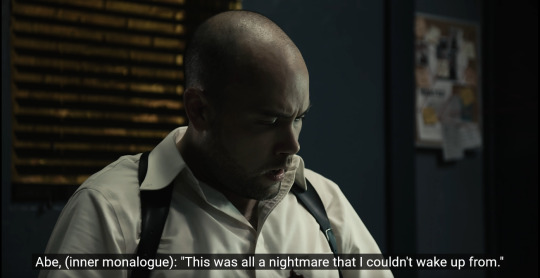
This dream he’s stuck in, he’s realizing, is something that he couldn’t escape. He suddenly realizes he’s been turning his wheel but going nowhere, like a ‘hamster ball rolling down the freeway’. But what Abe doesn’t realize is he’s actually awake for the first time in a long time -- aware that the world is broken, confusing, a dream that doesn’t make sense. He’s realizing that the boat is leaking and he’s still on it, sinking. Unfortunately or fortunately for Abe, it was Wilford who woke him up, the man in the whole who is still alive but going mad. He tells Abe he’s been through the same thing, of waking up and realizing, suddenly, that everything is happening to them in a weird dream. But at times, he can’t remember a thing. It’s quite tragic, but also beautiful, these two men realizing that, even in death, there is still something to enjoy, so instead of subjecting themselves to the story again, why not have some fun… outside of it?
Alright Back to the analysis. Where was I again?
ACT II: BUT THATS ALL IN THE PAST
Let’s go back a little bit, shall we? Because to understand Space… we need to understand Mark. Actor Mark, specifically. Yes, we all know that he is a sleazy, near-evil person who forced everyone to his house for a pre-planned party to get back at the people who wronged him. But what isn’t apparent, is what the point of that party actually WAS: To get back at the Colonel for ‘stealing’ his wife, Celine away from him.
So here’s a quick reminder of what happened:

Mark had a plan. A great plan! And in that plan, he was going to frame the colonel for his death and watch it happen, because Mark knew that he couldn’t actually die. The Detective, who was biased into thinking the Colonel did it, would find Mark’s body and would immediately blame the Colonel, because his prior investigations proved the butler and the chef were innocent. The District Attorney, us, would see the evidence, and agree with the Detective without dispute, which we were needed for since Damien wouldn’t be able to point blame at the Colonel, his friend.
But that plan went to ruin.
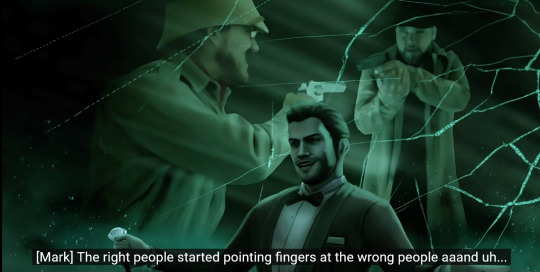
It wasn’t the detective who found Mark’s body; it was the the DA. Abe didn’t see the Colonel with Mark’s body; he saw us, and immediately placed blame on us for being next to the body. After we were cleared, however, it suddenly wasn’t certain who the killer was. Once that happened, the entity haunting Mark’s house stole Mark’s body back -- a body that was already killed by Mark 40 times before and was broken beyond repair. This left Mark stuck in the Void, with no way out.
But when Celine showed up, an opportunity presented itself. The House entity struck a deal with Mark where the House possessed Celine’s body, making sure she would never steal someone’s heart again. Once the house had possessed Celine, it killed Damien -- or, at the very least, pushed Damien out of his body. Mark took this body instead, leaving both Celine and Damien in the Void, with nothing but mark’s dead body as company.
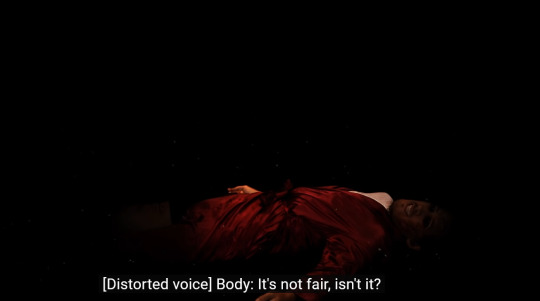
Then, everything descends into chaos... and the rest is history.
Basically, Mark didn’t want any of this to happen. Mistakes were made, deals were struck, and all of his friends died or went mad! But it’s fine, he surmises in the end, it will all be fine, because we all can’t die anyway! He knows, he’s tried! Which is great! That means he can make something beautiful out of this, can’t he!
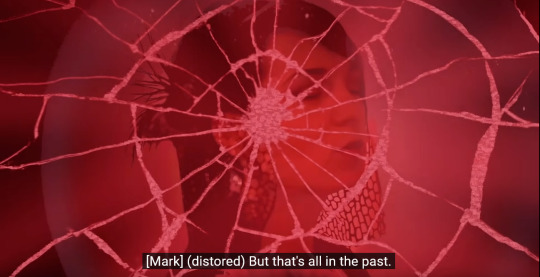
…Can’t he?
ACT III: SPACE IS SO COOL
And so we come back to Mark’s most beautiful creation yet. Space! And the Invincible II, his pride and joy. He has us along for the ride, and nobody to bother him. All of his pieces are in their places. He can’t wait to set off into this intrepid journey where everything is great and they hand the problems of space travel and he is the hero and us, the DA, is along for the ride to watch, just as we always are. We get to see Mark in the starring role once again! But as the story progresses… something starts… happening.
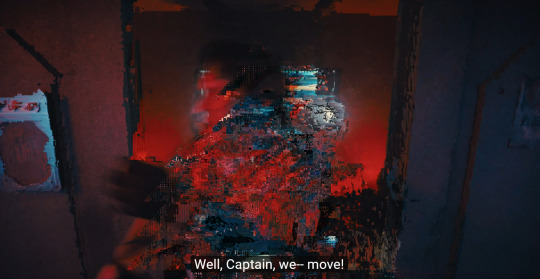
Things don’t seem…. Right.

And the more the story progresses…
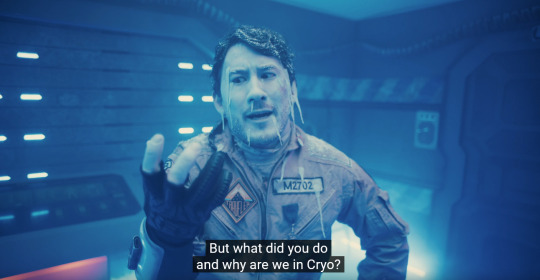
...the more things unravel before our very eyes. Seams fall apart. Back doors are opened. And strange people glitch in and out of existence.
And the strangest part of is all is… unlike his other stories, Mark is… perturbed. He’s out of control, he doesn’t remember things, he’s so lost that he thinks he’s in total control, but also has no idea what is happening and what’s going on. And the worst part is, every time either you or he questions anything, things start to fall apart more and more and more until finally;
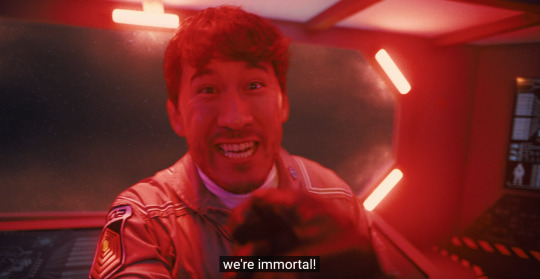
Mark has discovered what you already knew; that their existence has been looping and they’re immortal. Mark, of course, is elated by this news and immediately not only remembers dying, but also remembers the pain of it. This however does not deter him from doing so again. And again. And again. All in an attempt to fix the ship and save the colonists. However, that doesnt seem to be working.

But as he does so, he subtly starts shifting the blame to us. Their failure wasn’t his fault, he was doing the best he could! So what were we doing?
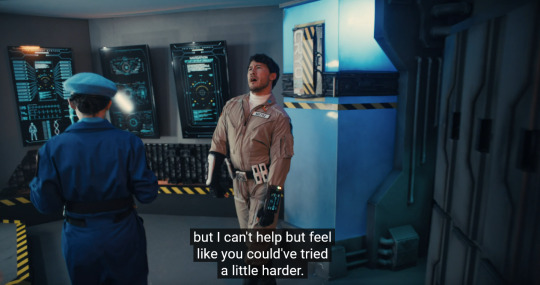
Mark is already starting to show his true colors; how he REALLY feels about the situation. He can’t possibly be the problem, it has to be something with the computer, or with us. He’s the hero, after all. He’s the one who can go back and fix it; fix EVERYTHING and save EVERYONE. He just has to find the right code, the right path, the right solution. He knows he can, he just has to keep trying. It’s infinity after all, right? And he can’t die! So why not keep trying over and over and over again?
Or at least, that’s what he starts to think. Because even though he shifts blame to us at every opportunity (‘It’s their ship, they are the captain’), he does still leave the choices in our hands, at first. And it’s clear that somewhere along the way, he decided that that’s the worst idea and we have done nothing we were supposed to, and doomed everyone.
Eventually, we are confronted with an older Mark, who says ‘To Hell with all of this; we are starting over’. And yet, even in his lunacy, he seems to have a few moments of startling clarity. His character breaks.
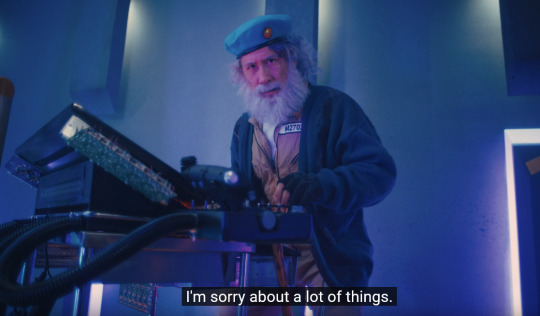
He apologizes to us. To us. Looking through the role we’ve been placed in, he tells us, ‘I’m sorry… about a lot of things’. He also says ‘but when you’ve tried everything else, there’s only one thing left to try.’
He sends us outside of the story. Outside of the cage. Into the Void. The same void he sent himself into, when he couldn’t figure out how to win Celine back. The Void he sent Celine and Damien into, when he couldn’t think of anything else but a deal with the devil.
The story is being reset because Mark has seen us start to become lucid, seen himself trying too hard, and wants to pull the plug. He can’t make anything else better! So now, it’s time to try again, make a new story.
And for a time, he thinks he’s done it.
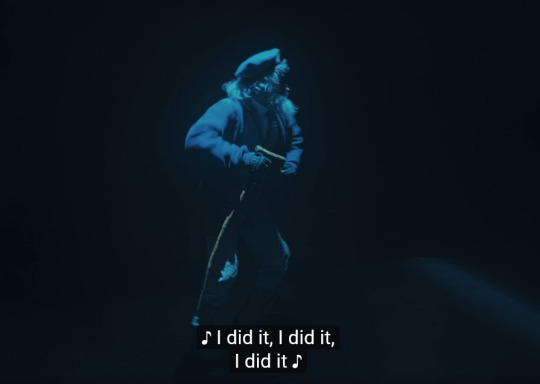
And then, he forgives us, for everything. Why?
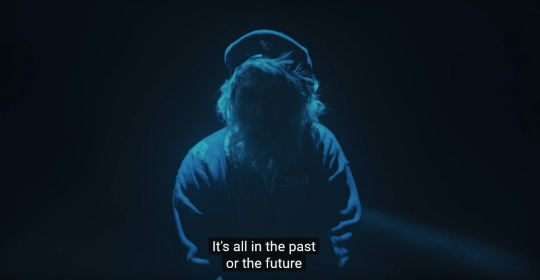
Because its all in the past. And he finally did it! He beat us! We can’t destroy the universe, he did it first! He’s going to save all those people! Why?
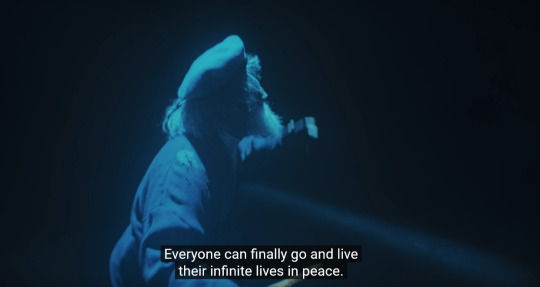
Everyone can finally go and live their infinite lives in peace. At this point, we can’t help but wonder… is Mark still talking about the ship? The Invincible II? Up until this point, we assume he has been, but ever since sending everything to the void, he seems to be thinking of others things, other consequences.
Ah well, we won’t find out in Part 1. Because right now, the world is collapsing. The Warp core that disappeared originally suddenly reappears, and what Mark wants can’t happen. And the universe resets and suddenly… horribly…
The Story begins again.
ACT IV: WAKING UP IN A WHEEL

Have you ever heard of the Bicameral Mind? It’s the supposed moment when humans became conscious; when the two divides of the brain came together to form a whole. You see, one side, was the side that seemingly talked, but there was no thought behind it. And then the other half was the half that listened, and obeyed. It’s said when these two parts of the mind merged and met in the middle, that was when our self-consciousness, our self awareness, was evolutionarily born. It is of course a hypothesis, and not yet proven to be true, but here, in the reboot of Mark’s story, in his universe…. It is true.
Free Will is an illusion. And we, we are totally and 100%... aware of it. Like Wilford before us, speaking to a sleeping Abe, we are aware that things don’t make sense, that things aren’t what they should be. Like Wilford, we can now see; our boat is leaking, and its real bad.
The next question is though… is our ‘Abe’ aware, yet? And does he yet know that the boat is also leaking?
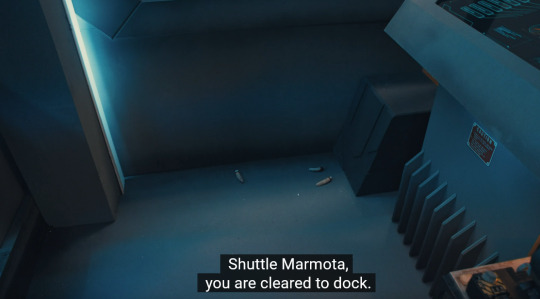
Speaking of leaking boats: Shuttle Marmota. You know it’s funny; Marmota is a family of ground squirrels, and the most famous of those ground squirrels is the groundhog. This is a pretty obvious reference here; Mark is harping back to Groundhog Day, a Bill Murray movie where a man relives the same day, over and over, trying to fix the mistakes and get out of his loop. There’s also a recurring theme in Mark’s works about hamsters in wheels. And how they go nowhere. These little rodents that run and run and run, going in circles, but never actually moving forward. They only think they are.
And this section is about one of those little rodents, thinking it’s moving forward, again and again, but they’re stuck. But they don’t know they are stuck. And for better or worse, only we can pull them out of it.

There’s an old saying about ‘getting lost in the sauce’. It’s an idiom that has a few meanings: One is when someone is so inebriated, that can’t tell left from right, and have no idea what’s going on. Another meaning is someone who is wholly preoccupied with a strange event, something out of the ordinary. Another is someone who is completely oblivious to their surroundings. And finally, there is a meaning that is denoted to someone who is neglected, someone who has been feeling abandoned, lost and alone in a crowd of people.
It’s hard to see Mark, Actor Mark, as being someone like that. He’s the one who makes these worlds, after all! He’s got all these beautiful plans, and brilliant stories! Hundreds of them! Millions! Countless! How could he, the creator of these stories, really be lost in his own sauce? How could he get lost in his own stories? That’s impossible, isn’t it? What kind of reason would Mark have, to not only reset the universe, but also reset himself, to the point that even he forgets?
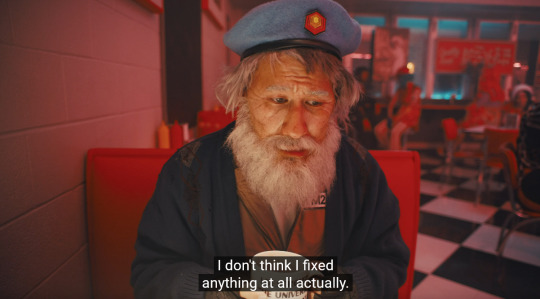
It appears the answer is… remorse. As this new universe starts and we see Mark in different roles, We meet his old self in a diner, and he laments over his decisions, and his mistakes. In doing so, his old self seems to have a moment of clarity:
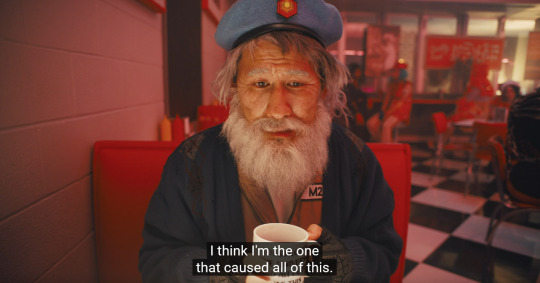
For the first time in the entirety of Space (Or Hell, in the entirety of the Markiplier continuity), Actor Mark tells us that these are his mistakes, and that he is the one to cause all of this. He then instructs us to tell his younger self NOT to go back-- we of course, don’t know what this means, not yet, but we will soon. However, its really hard to remind someone of what they shouldn’t be doing, when they are running so hard from their problems that they don’t even know what role they are playing.
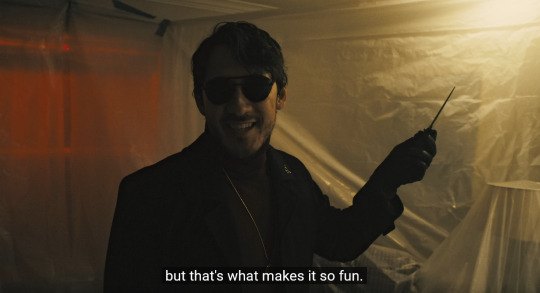
Mark appears to us as a murderer, a divorced father, a lover ready to go on his first date, a porno star, a cryptid named heehoo, a camp counselor, a bomb diffuser. And every time, we have to try and follow him down his rabbit holes. We have to wake up him. And sometimes…

Sometimes, he stops running away. He realizes what’s going on because we tell him. We finally get our hamster, running his wheels, to wake up. The only problem is, every time he wakes up, he’s right back where he started.

He still blames us.
And it’s incredibly hard, its so frustrating and difficult, for us to see every possibility, every world, every ending, before we can say or do anything. Our semblance of choice, our free will is gone, and we are wide awake to remember all of it. Have we slept? Are we making progress? Are we also slowly getting lost in some sort of sauce ourselves, as we try desperately to spin our hamster wheel in a futile attempt to catch Mark before we lose him again? Does Mark… even want to be found?
Because there does come a time where one has to wonder how much of this is denial, on Mark’s end. The constant running, role swapping, forgetting. He doesn’t want to remember, maybe. Perhaps he wants to forget. Ignorance is Bliss, after all. Easier to forget and start a new world, a new life, instead of having your past mistakes chase after you, again and again.
And what are we, but a past mistake, chasing after Mark’s roles? Trying desperately to get through to him?
ACT V: I CAN NEVER BE FREE
Mark, throughout Space, sometimes feels like a lost cause. But after we wake him up enough times, we start to see moments of… clarity. And this clarity first comes to us in the form of an old friend of ours who helped break out of prison:
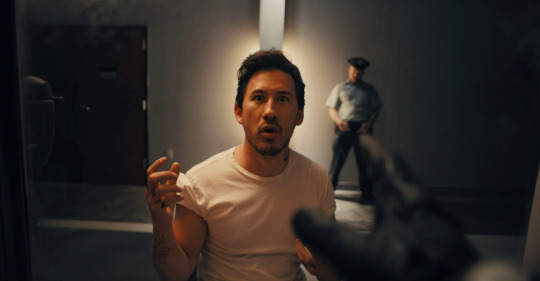
Yancy.
Now, this will be a little controversial, I know. Many people in the fandom adore Yancy, for good reason, but they can take the news that Yancy is actually Actor (someone we have been trained to hate) pretty hard. But whether or not Yancy is truly Actor in disguise, the parallels drawn between these two men and their current predicaments cannot be overlooked. In Heist, Yancy does not want to leave prison; why would he, he has everything he wants! And at that time, Actor had no reason to even think about leaving the House, or his stories. He was content and happy! So why would he want to leave?
But for Yancy, and subsequently Actor, something has… changed their mind.
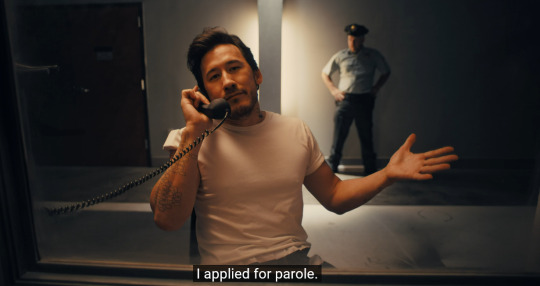

Yancy has chosen parole over being locked up. He thought about what happened, what we said, and has decided… I don’t want to live like this forever. Maybe I should change my circumstances, move on, instead of running my wheel here. Also interesting to note that, while we speak to Yancy, it is through a glass window, one that is reminiscent both of the screen we view the shows through, and the mirror we got locked into.
What does this say about Actor though? It means some part of Actor, despite how much bargaining and denial he may be in, is still interested in getting out of the loop. He’s tired of spinning his wheels. He wants to move on but how? He doesn’t know. He can only have one last hurrah before… before trying to break free. And get out of this place.
Then, as we leave Yancy behind, finally, finally, we start to get the truth out of Mark. ACTOR Mark, not one of his personas. He speaks to us straight. Or,well, in song.
Space was so cool…but now?
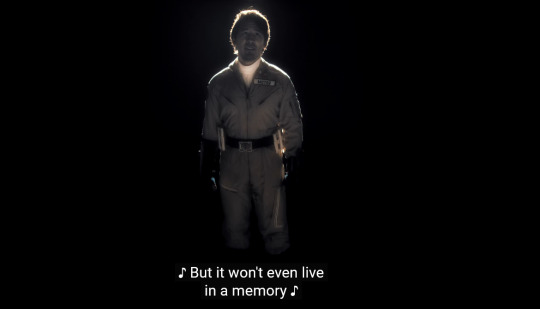
Universe unspooled, so cruel, to be leaving with only a melody… So pretty… What a pity
It won’t live in a memory… because he’s been forcing everyone to forget. To start over. To just play a different role and move on. He so intensely wants to find a solution to the problem, he wants to start trying again, but what will that do? What will it accomplish?

But now its all pulling apart…
Mark is starting to remember… everything. He knows what’s wrong, and he thinks still, if only there was a way for him to uncover every stone, and never give up. “Stay bright till we’re burned”, he says, but what good is it to be burned? To be hurt in the process? What if you’re burned so badly you're scarred, forever, Mark?
After the song, we are transported directly to the diner… To the end of all things. We meet an old friend once again, and he talks to us about the end. As he does so, he starts to say some… interesting things.
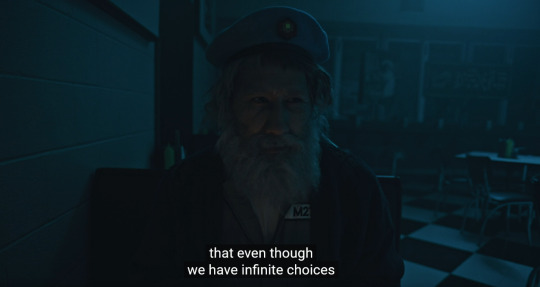
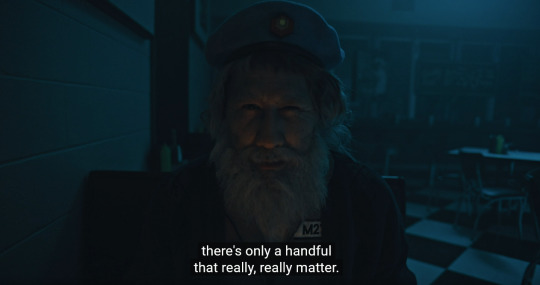
We actually heard this from someone else before… Dorene.
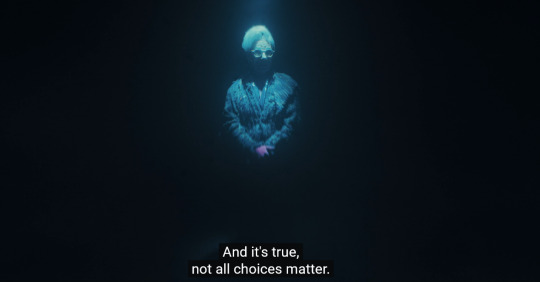
This is most certainly a reiteration of theming, but it is worth noting that this other line comes from her, and that the two ‘elder presenting’ characters in this are the ones that are speaking about how not all choices matter, just a few. Perhaps there is some wisdom there. Some choices are everything, after all.
But it’s what Mark continues with, that is most telling. He tells us that, here at the end of all things, he is content. Happy.

He is this close to finally having an end to all of this. All this… running around, back and forth, going and coming back, living and never dying. He’s so close to an end. His end. But there’s also something else, hidden in those words. A real sadness, of something that was understood far too late into his life by this point.
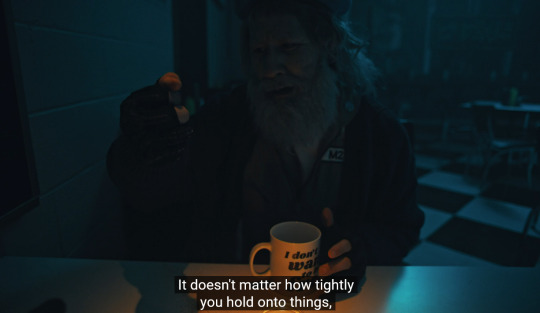
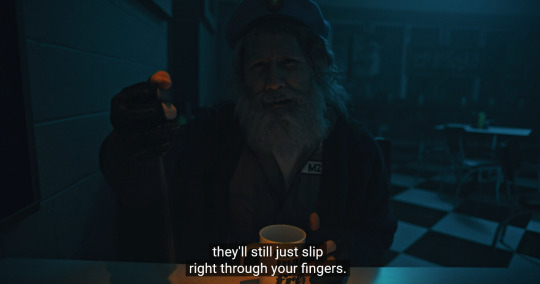

Mark is talking about something entirely out of the purview of the story we’ve been trekking so diligently through. He speaks of loss here, of something he once had, that he held onto too tightly. However, like sand, it doesn’t matter sometimes how tightly you hold onto something, it may still leave regardless. And perhaps, maybe that’s okay. He surmises that mistakes will always happen and that some things, are just not meant to be.
Of course, Actor Mark here is entirely talking about Celine.
Celine, the woman he desperately tried to hold onto. Celine, the woman who broke his heart and left him. Celine, who ran off with his best friend and left him, alone and confused and heartbroken. He agonized over it for YEARS, blaming her, blaming anyone but himself. And it’s only now that he finally understands.
A moment too late, really.

Or is it?
This version of Mark disappears right before our eyes, but we are still here. We haven’t met ‘the end’ just yet. So what is it, then? One can only assume that because this Mark is gone, perhaps the paradox resolved itself. That seems mighty hopeful but then, isn’t that all someone needs, in the end?
ACT VI: THE LAMENT OF THE ACTOR
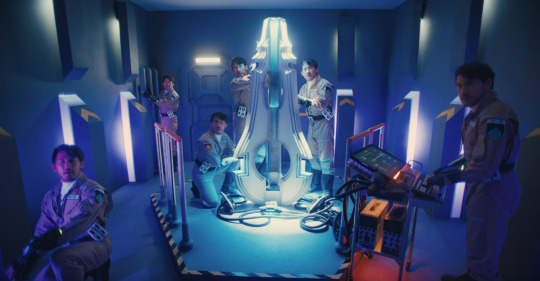
We open the door. One last, final door. And as we do, we enter into the final act one.. last... time.
Despite the apparel, we are not greeted by Head Engineer Mark in this room, oh no. He looks the part, plays it, but there is something else here. Something bubbling under the surface; a resentment, a remorse, an anger and a bargaining chip. The warp core, built by Mark himself, sits in the room. It’s his salvation. It’s his way out.
He has to go back. He has to save everyone. It’s his obsession, his absolution, his white whale. It’s the only thing he’s ever known. To save everyone, he has to stop us. He is dangerously sure of it.
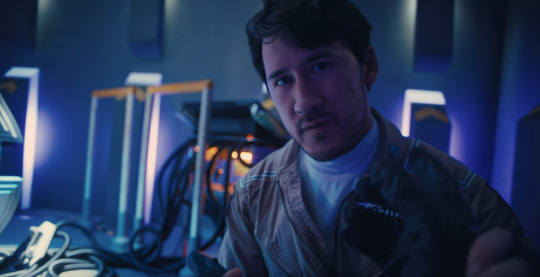
Remember, back in Act II, where I recalled Mark’s plans? His perfect revenge to get back at Colonel all falling to pieces, because of us being in the wrong place at the wrong time? Keep that in mind, because it’s important, going forward.
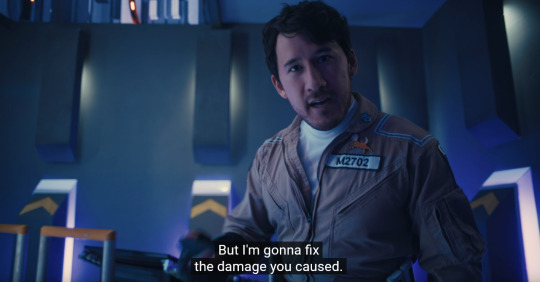
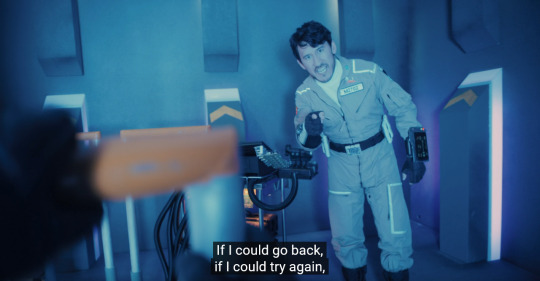

Mark is still convinced that we are the problem here. He’s laying it all on us in a huge, prepared monologue. Who knows how long he has been sitting on this, thinking about this, ruminating over the warp core and the decisions made long ago that he can’t figure out how to undo. He’s thinking about all the friends he’s lost, all the grief he feels, and how he’ll be the hero, if only he can stop us from doing… whatever it is we did. And suddenly, in the most pivotal moment of all…
We learn Mark doesn’t even know what it is that we’ve done.
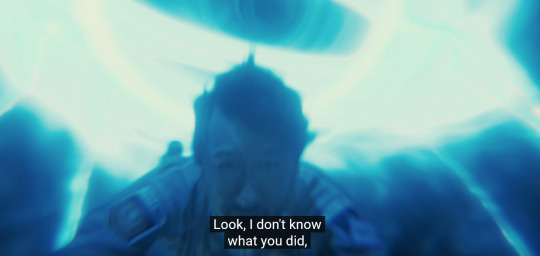
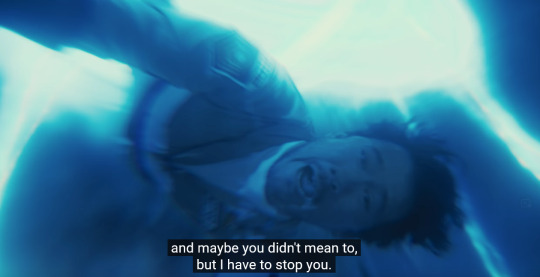
And it isn’t until we refuse to let him go, when we hold onto our hope does he start to understand, fully, the ramifications of our actions.
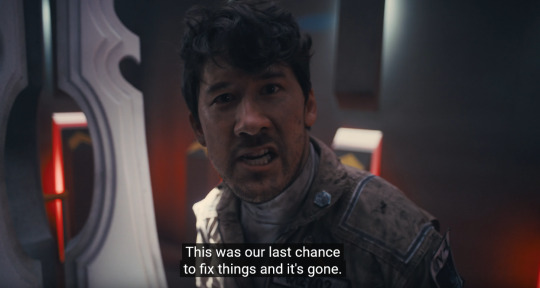
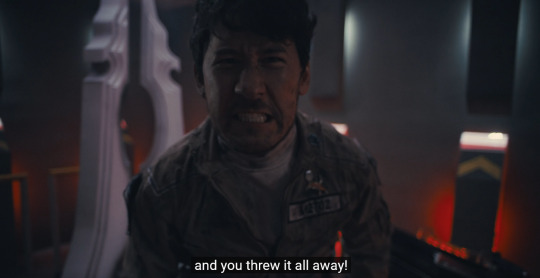
Mark is grieving. He wants to go back and fix things. He isn’t just talking about the ship anymore, though to his credit, he keeps that act up rather well. What we are seeing here is a Mark that has had an eternity to think about what happened and was so sure that if he went back and fixed what we did wrong in his plan, nobody would die. But the world doesn’t work like that. The party still happened; we can’t change it. We can’t change the past and undue the mistakes we’ve done.
Once Mark realizes this, once he realizes what would happen if he chooses to never go back, He has his full wake up moment.
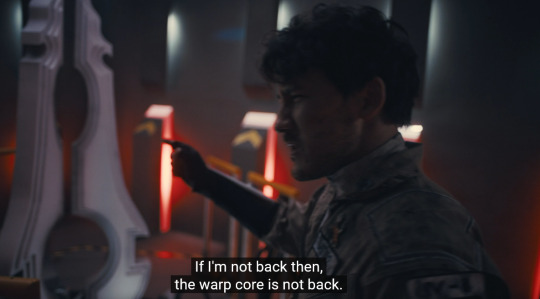
If I’m not back then… the party doesn’t happen?
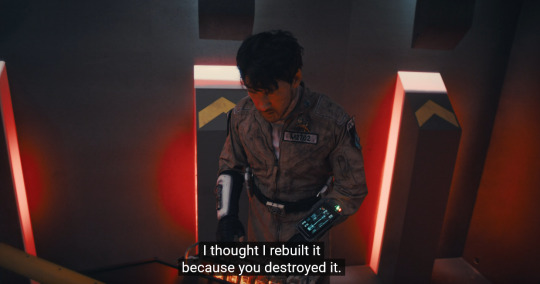
But I thought the problem was you, because you were the wrench in my plan.

But I caused the problem at the party?

I caused all this.
And as soon as Mark makes this realization, that he finally understands that he caused the problems… the By Lake Surprise piano overture begins to play. This is song that binds everything in the Who Killed Markiplier series together, this piano key denotes somber tones, character realizations, and the tragedy of endings and beginnings. This is Actor, finally, coming to terms with what happened and suddenly realizing that… He caused the pain of his friends and drove Celine away.
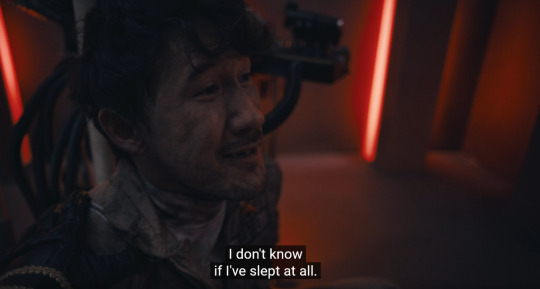
For the first time, Actor is honest and we see the real Mark. We see, probably, for the first time in the entire series, the man that Celine fell in love with, who Wil and Damien was best friends with, before a broken heart and an evil, possessed House turned him into a warped, angry version of the man he once was. A man blinded by his rage and agony, that for countless lifetimes, he believed that everyone else was the problem. And only now is he seeing what it really is. And he realizes… He’s tired. He hasn’t slept in ages. He can’t even die properly. He’s been running shows and going down rabbit holes for eons and eons… for who knows how long. This is a man suddenly bearing his soul to us, his full amount of pain and tragedy, on the floor, at the end.
And for the first time, he says this and he means it.
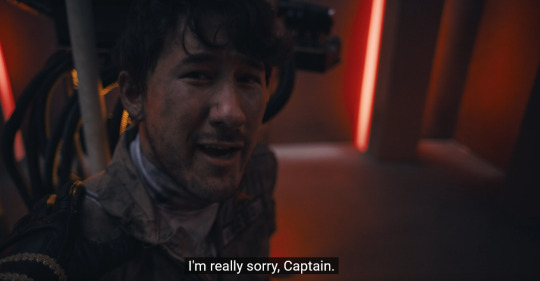
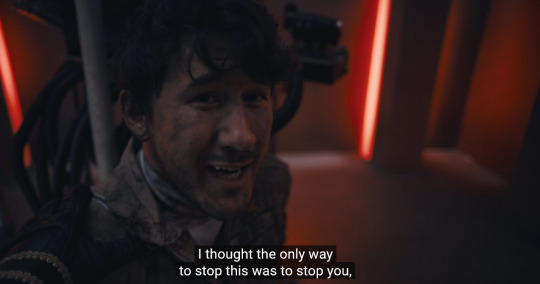

And in the end, we, the DA, the long time companion of all of these characters and especially Mark, who has taken us on story after story, kept us asleep and then awake, forgetting and now remembering everything… We know what happened. He knows. And he’s sorry. And for the first time, not only can we hear his apology, we can accept it. Wholly. Entirely. Completely.
You see, in the end, sometimes, you can’t fix everything. We can we regret so much. We can have so much pain. We can miss those we love and wish to hang onto them forever. We want to right the mistakes, rewrite the past. But we can’t. And sometimes, that’s okay. Some things just can’t be fixed. And we have to learn to be alright with that.

What a beautiful tragedy this all is, isn’t it?
In the end, the story concludes. Actor Mark allows this one to roll into the credits and lets everyone play out the last remaining lines. Celci congratulates us and Burt reminds us that all is as it should be. And then Mark… well.

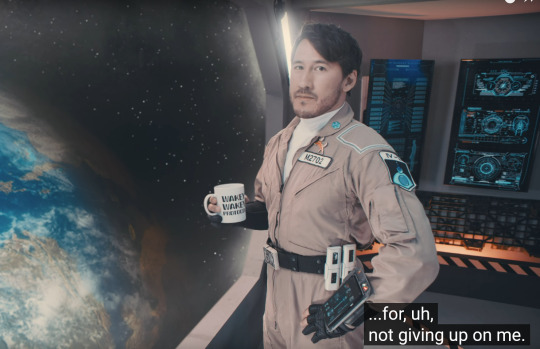
I think it’s safe to say that, no matter what the future holds, Actor Mark is ready to move forward. He’s accepted his truths. And he’s ready, finally, to be free.
EPILOGUE: THE OTHER SIDE OF THE BROKEN COIN
You know, every story has a choice, even in the end. And while we can hold onto Mark and bring him to his conclusion, there is another side to this story. A very important one at that.

Dorene.
Yes, Dorene. Her conclusion here is just as important as Mark’s, and is very important people understand why.
That’s because when mistakes are made, it is rarely, if ever, only one person’s fault. It’s usually the fault of both parties, in some way, and both parties need to come to terms with their choices, whatever they may be. And Dorene, being Dark with an aged Celine at the wheel, has had a lot to think about these days.
First off, yes, I 100% believe that Dorene is the entity we know as ‘Darkiplier’, secret ending to Space or not. Remember that Dark has never been named, and that Celine is just as important a part of Dark as Damien is. Just because we see Dark as predominantly male with Damien in the front, doesn’t mean that is all Dark is. This line here proves it:

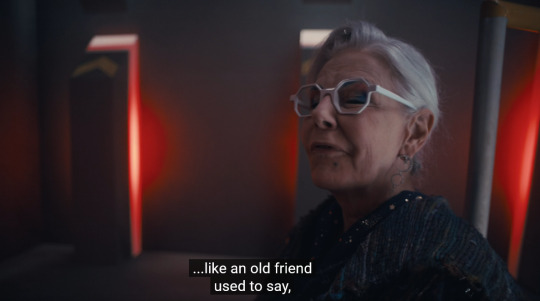
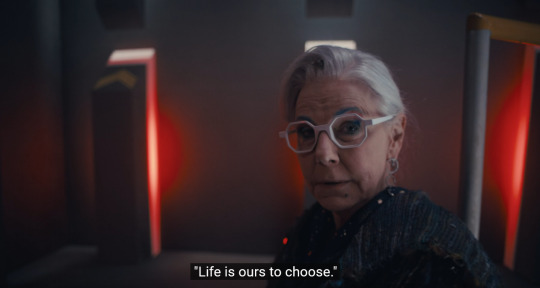
She speaks Damien’s line and almost refers to him as her brother. But it is important to note that neither Celine or Damien are the same anymore. They are one and the same. However, that doesn’t mean they can’t hold onto their memories. And what sort of things would the Celine half be reminiscing over?
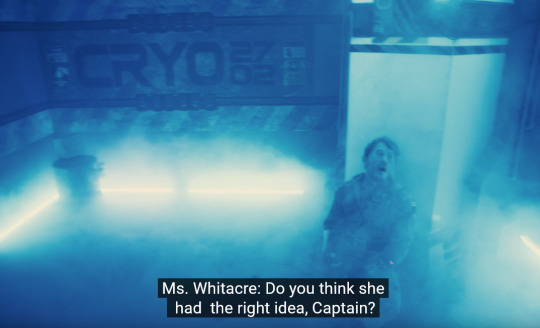

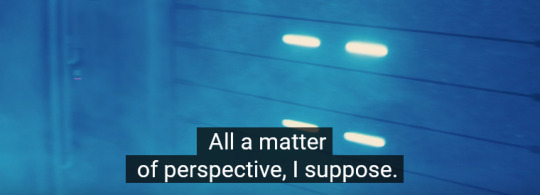
In a room with a frozen Mark dead on the floor, Dorene can’t help but ask ‘do you think she had the right idea?’ One could be mistaken in thinking she is talking about Celci here. But who is Celci, if not an analog for Celine? And what sort of decision did Celine make, that would be a matter of perspective?
She chose to leave Mark. And that decision, good or bad, sparked everything that came afterwards.
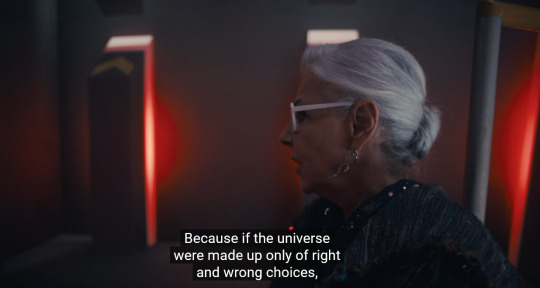
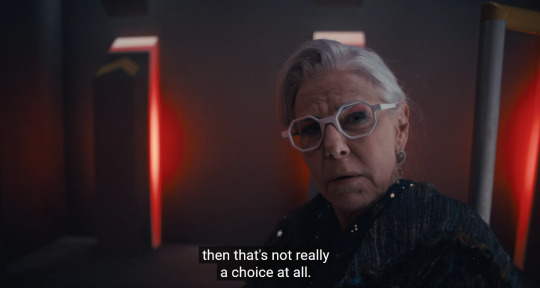
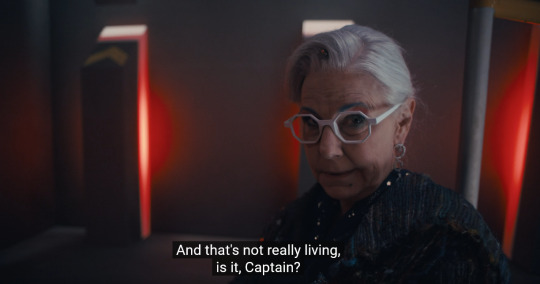
This Celine!Dark, this Dorene, is older, tired, a worn and broken soul. And she’s had a lot of time to think about that decision she made, so long ago. Was it the right choice, to leave Mark? Was it the wrong one? It hurt so much, but who was it right or wrong for? And she has come to the conclusion that she had to make a choice, because otherwise she wasn’t living at all.
She shows up like this in the ‘Let Go’ ending, which just sends us back around to start over and try again. I think that is because she’s trying to send us a message, send Mark a message, and try and get everyone to move on and stop spinning the wheels when the hamsters are dead. She wants Mark to let go of her, and to move on and find happiness, but she also needs to make sure we understand the ramifications of the choices we make as well. And she’ll remind us, over and over again, of how stubborn we are, how it feels like you’ve been here before. She’ll do it as many times as it takes, as long as it gets you to fully wake up.
And when you do, you’ll hold on. And she’ll be there to congratulate you in the end when you do, one way or another.
#iwm#in space with markiplier#actor mark#markiplier#dorene whitacare#y/n district attorney#the captain#who killed markiplier#wilford motherloving warfstache#damien#darkiplier#analysis#meta analysis#theories#my theories#long post#i love you all#this is a culmination of everything#and i mean everything#if mark doesnt talk about all of t hese things#in his stream#ill idk#eat a shoe#please dont hold me to that i hate shoes#i have been fighting tumblr on the formatting of this for 2 and a half hours#im so tired#please enjoy this#please
953 notes
·
View notes
Text
ST analysis/S5 theories Part I: Will and Henry - parallels and differences
I started making theories on S5 the moment I finished S4. It was so good! Of course, theories should be fun, and they come from my immense love for this story and its amazing characters. If what I speculate doesn’t happen, no problem. I just hope the story is good. That being said, let’s have fun!
There are so many theories to discuss and analysis to make. Where the powers come from, Will and Eleven, the parallels between the two Byler relationships (Nancy/ Jonathan, and Will/ Mike) and so much more! But today let’s talk about my favorite character, Will Byers. He didn’t have much to do this season, but his scenes were among my favorite. Some of them were so beautiful and heartbreaking. Noah Schnapp is such a talented actor. But more importantly, some of the most shocking reveals of the show that we got in S4 involve Will directly. That’s why they had to send him to California, imo, or it would be even more obvious. This proves his fundamental role in the story and in the last season of Stranger Things. I’m talking about Henry and Will’s parallels, the Upside Down being stuck at 11/6/83, the day Will went missing, Dustin telling they needed Will, and Nancy mentioning how he found a way to communicate with his mom with the lights. They really wanted us to think about the mysterious week he spent there alone. And for good reasons.
1. Parallels between Will Byers and Henry Creel
They’re obvious and very deliberate. From the words to describe them (sensitive kids), to their clothes and love for drawing. The writers went out of their way to make us notice how similar they are. Of course, it’s important for the story.
Two sensitive kids who love drawing
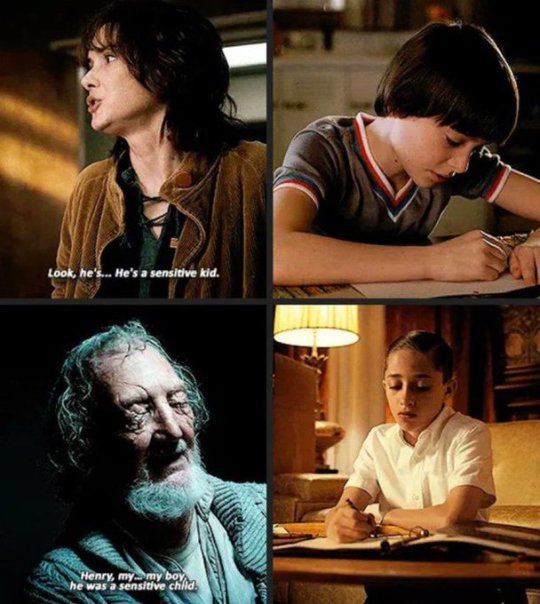
Almost the same clothes
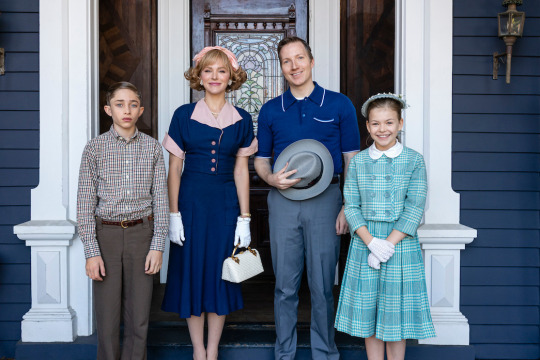
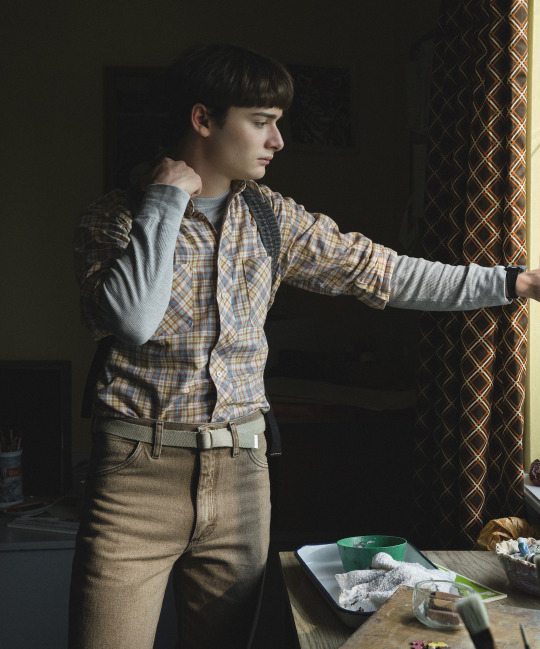
They both drew the Mind Flayer.
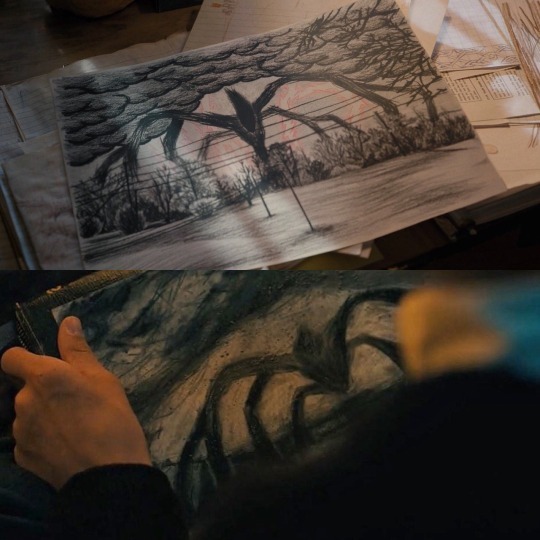
Both Vecna and Will are called wizards. The password to enter Castle Byers in S1 is Radagast, the name of one of the wizards in The Hobbit/Lord of the Rings. Also, notice the flames on Will’s cloak. Flames, fireballs. The only thing that can hurt the creatures of the UD. Coincidence? I think not.
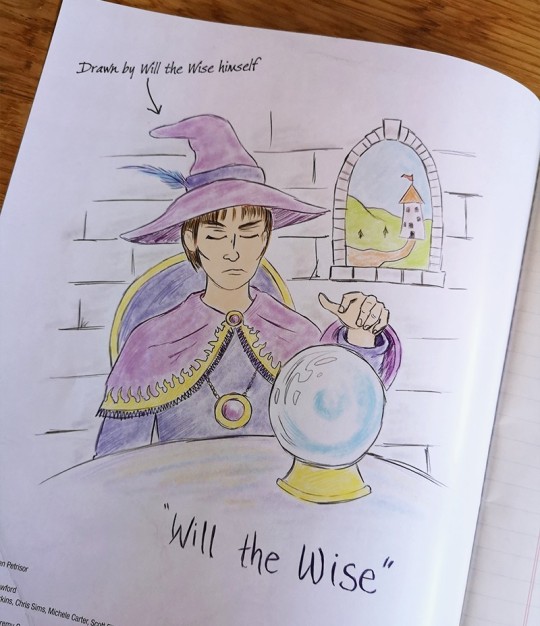
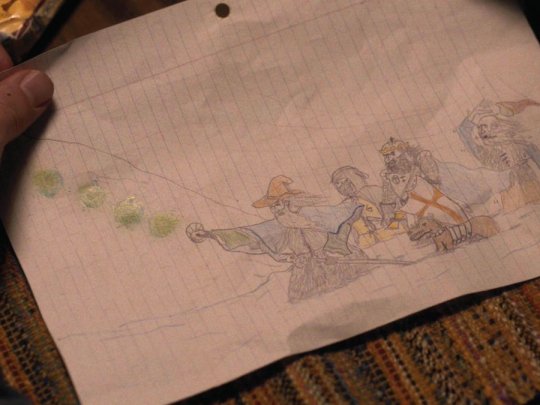
Hopper, in S2, asks if they can kill the Mind Flayer with fireballs
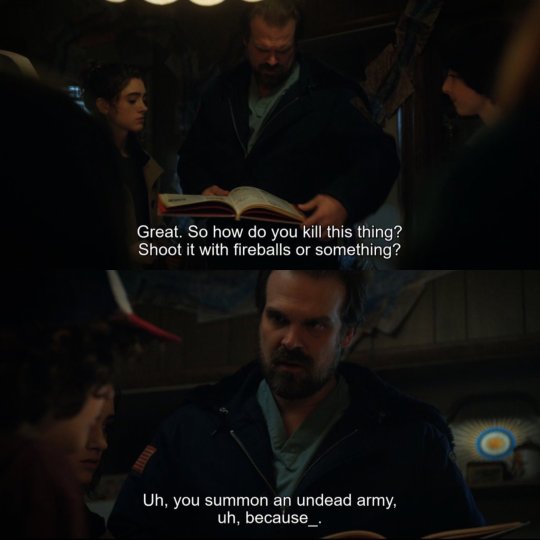
Even the littlest details show the clear connection between them.
Will in his classroom, in Lenora. Behind him, the name Henry
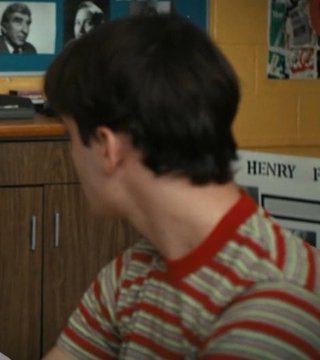
Henry’s infamous grandfather clock. The name of the manufacturer: Williams The clock was important in S4 and will be even more important in S5 (the theory on why is here )

So yeah, we get it, Duffer brothers. Will and Henry are similar (cough, and they both have powers, cough)
2. Differences
Henry didn’t have a loving family. His father seemed to at least care about him, but they didn’t seem close. Henry calling him blind and dumb could mean that he didn’t see many things, not just that he lost his eyes. Henry’s mother despised him and wanted a doctor to lock him up to fix him. And I’m sure he didn’t have a bond with his sister, who probably considered him a freak. Henry was a lonely, kid, like he said, deeply misunderstood, and when he realized he had powers, he didn’t have anybody who could guide him or stop him. So he started to use them to hurt others. He became a predator. He said: But for good. So he didn’t just kill for fun. But that doesn’t change the fact that he chose violence.
Will has an awful dad, but he has a loving mother and brother. He has friends he loves fiercely, especially Mike. People who would do anything to protect him. And Will’s so selfless that he was even worried about Jonathan’s hand, when he was the one who’d almost died in a scary, alternate dimension.
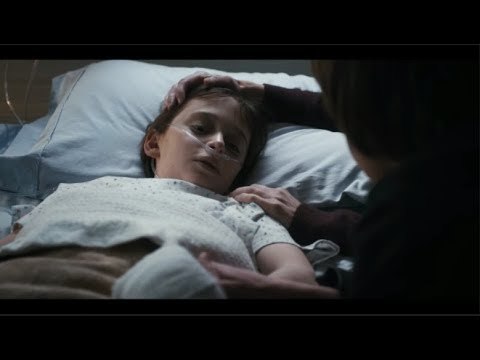
So why showing us how similar Will and Henry are? Some people think it’s foreshadowing of Will becoming like Henry. I disagree. We know that in S5 Will will have a huge role, but it’s going to be, to quote the Duffers, “the beginning of his coming of age”. I doubt they want him to be possessed again and start killing people. He’ll be a hero, not a villain.
Anyway, I think it is possible that Will only has vague memories of what happened to him in the UD. I’m sure people told him what he did, about the lights, the cassette player, the phone calls, and he was just like, hm, yeah, I did those things. It wouldn’t be too strange. In S2, Lucas told Max that Will didn’t want to talk about his experience. And let’s be honest. Has anyone ever asked him how he was able to almost open a gate in his living room? Or how did El recognize him from that pic? They never answered those questions. So maybe the answer in S5 will be something like: We were so focused on saving you, that we never really thought about it. Or, you always said you didn’t want to talk about it. And Will could say that it was all confused and he just remembered he was always cold and scared.
Maybe he can’t remember because of the trauma. Like El forgot about Henry and the massacre. Or it could be something that was done to him. To let him stay dormant until Vecna or the MF needs him, once the UD starts to merge with our world. Will literally said that to Max and Lucas in S3, when they were talking about the Flayed people: “It’s like you’re dormant.” The actor who plays Henry said that Vecna and Will have history. So, in S5, Will could realise that he knows more than he thinks and will need to remember every detail about those terrifying days. And in doing so, he will find the answers they need to win.

S5 SPOILERS
From some bts photos, we know that someone will get targeted by Vecna, or will have visions, or will have to reliving memories.
Noah posted this pic on IG. He wears the same harness used when Max got Vecna’d in 4x04.
EDIT: It seems that the harness was for the van scene, for safety. But the other pics are still proof that something weird is going to happen, for sure
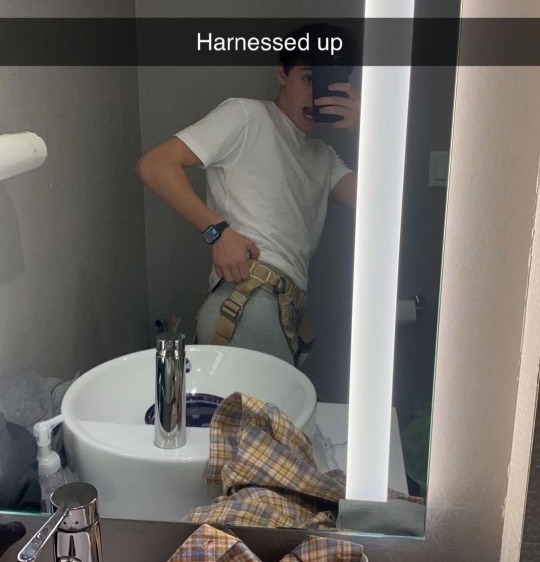
This is a flying harness.

In the S4 read table we see the actor who plays Lonnie. But we didn’t see Lonnie in S4, so either they cut his scene or they’ve already filmed a few scenes of S5.

And here another bts pic of Noah and Millie at the Rink-o-Mania. Noah wears the same brown shirt. In the actual scene he doesn’t, so this happens later, in a vision. Whose vision? Who knows? Will's? Mike's, if he gets Vecna'd? Look at Millie’s dress. Yep. That’s the milkshake.

But even tho we don’t know what these pics mean, the hints throughout the whole show are clear: Will is important and has a deep connection to Henry, the Mind Flayer and the UD, because he has powers too. And this is one of the biggest surprises of the show.
3. Will wasn’t just a random victim and the kidnapping scene proves it
How:
The Demogorgon’s attack is different
The door opened with telekinesis (no creature in the show has ever used that power. Not the Demogorgons in S1 and S4, nor the demobats or demodogs. They could include that element in other seasons, but maybe they didn’t because they decided it could actually mean something)
The shed’s light (this detail comes back in S4. In the Creel House)
1) It really seems that the Demorgogon specifically targeted Will, because after the kidnapping we learn that the monster chases preys that are bleeding: Barb, the deer, Jonathan and Nancy, the government men (at the school, Mike even says twice: “Blood! Blood!”) But the monster never really attacks Joyce. Imo, because she wasn’t bleeding. The Demogorgon just didn’t want her to help Will. And Will wasn’t bleeding either. We have confirmation from Hopper. When he finds his bike, Joyce explicitly asks if there was blood on it and Hopper says there wasn’t.

We also know that, despite the fact that he wasn’t bleeding, the Demogorgon followed Will for a mile. We know it was a mile because at the funeral Jonathan shows Nancy a map of Hawkins. The writers started the show with Will’s kidnapping, when we knew nothing about this world and this monster, and then spent the rest of the season showing us what the Demogorgon does and doesn’t do, how it attacks its prey, and what attracks it (Mike at school: “Blood! Blood!”) The Duffers never openly told us there was something weird about Will’s kidnapping, or that Will was somehow special. They showed us that his kidnapping was different from the other attacks.
Will’s kidnapping was important for the plot so they made it as mysterious as possible. True. But it’s also what they did AFTER S1 that, imo, confirms that what happened to Will was actually different. They could add information, details in later seasons that made that scene more like other attacks. But it never happened.
On the contrary. At the end of S1 Will dies. So it seems he was just a random victim, right? But then in S2, when the Duffers said they planned out the rest of the show, suddenly Will tells Owens that this evil he’s seeing in the sky wants to kill everyone but him. Maybe, since he survived, Henry/Mind Flayer thought wait a minute, can we use him again? Sure. Or maybe Will’s “death” means something else. Because we know for sure that he wasn’t just a random victim like Barb or the other people. The very world he was trapped in apparently is stuck on the day he went missing (and not when he was intubated) That means that whatever being was in control there, the MF or Henry, they knew that something big had happened. And I refuse to believe they didn’t know it was Will. So, simply killing him and let him rot... Nah, not possible. Even if they wanted to kill him, it was for some specific reason. Stealing his powers, turnng him into an undead (He’s not breathing!) a creature of the UD. A... Zombie Boy the MF could control. We’ll see.
All of this, of course, makes me think that the Demogorgon showed up in the middle of the street to kidnap Will.
He was targeted because he too is sensitive to (the Force) powers. He had the potential. Like Henry when he was 12. Will’s not an experiment or the child of someone who was part of Brenner’s experiments, like El. I think Henry and Will’s abilities were directly activated by the source of the powers itself. The UD/Mind Flayer. Henry’s in 1959, in his house. Will’s in the UD, on November 6th, 1983. That’s when his life changed, in many ways.
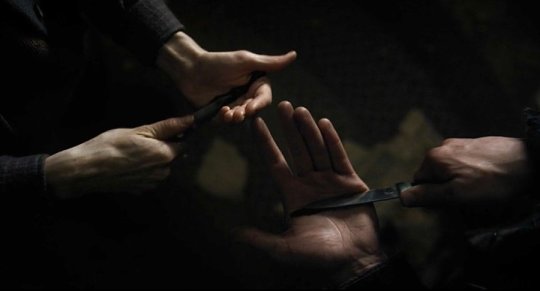
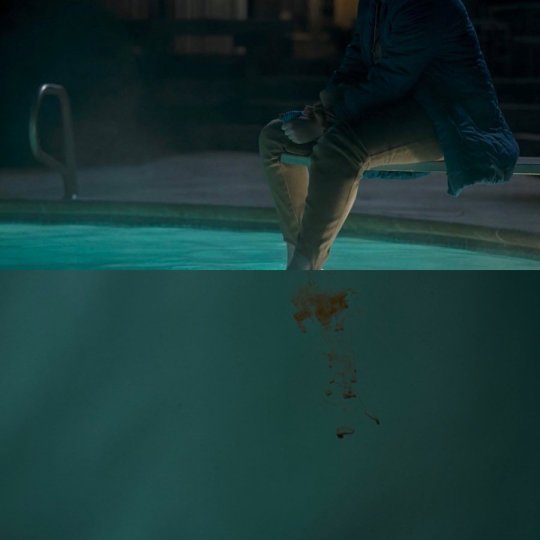
2) I read the theory that it was El who opened the Byers’ door with telekinesis. That the Demogorgon was actually chasing her, she saw Will, (the reason why she later recognized him in the photo), but didn’t help him because she was scared. I disagree. It wasn’t her at the door. It was the monster. Will saw its tall shadow in the door’s glass. He heard it growling and on the phone when he tried to call 911. Plus, there was no reason for El to open the door in that moment.
But it’s interesting that no other creature has ever used that power again. Not even Billy and the Flayed. My theory is that the Demogorgon in S1, as the only creature El touched when she opened the gate, kinda absorbed her powers, like Vecna did when the MF bit her in S3. And that’s also why the monster was also able to temporarily open small gates. Something we’ve never seen again. Also, in S2 and in S3, we see El opening a lot of chain locks (the Byers’ too, in 2x08. Same shot!) imo to make us make the connection that the Demogorgon was in fact using her powers in S1. But the point of this moment, imo, is that the monster could smash that door and grab Will. But it didn’t. And I find that detail very interesting.
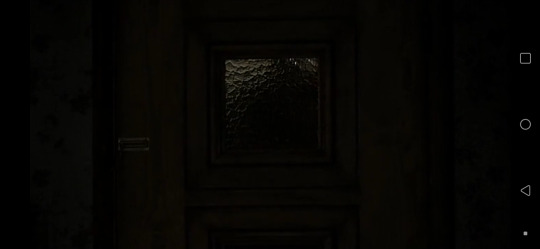
3) More thoughts on the Demogorgon. I know that it first killed a scientist in the lab, so it may seem that it wasn’t there for Will. Well. We already knew it was there to kill people. It also attacked Barb, two hunters... It wasn’t always at the Byers house in the UD during that week. But the Demogorgons in S1 and S4 we saw were always ferocious. They growled and screamed. Only the one that got Will was quiet. Also, the bike light flickered just a moment before Will saw it. I think it’s because it had just opened a small gate in the middle of the street. It totally makes sense to think that it knew Will was coming.
Oh, one more thing. Nancy saw the Demogorgon at Steve’s and the monster was so close that she noticed it didn’t have a face. But it didn’t attack her. Maybe because she wasn’t bleeding? Or because it wasn’t hungry? But it did chase Will for a mile even tho he wasn’t bleeding. And if it was hungry, I bet it would’ve been much more aggressive.

The only season that seems to imply that Will was a random victim and is not special at all is S3, the season when he feels ignored and says that the MF has found “another me”. Billy.
Now, of course possessing Will again would be too risky anyway. He knows what the MF is and they could try to stop it again. But also, in that season Henry just wanted to get El’s powers and killed her. And he needed the Flayed’s bodies to build the Mind Flayer. So imo, Will being ignored doesn’t mean that he’s not important.
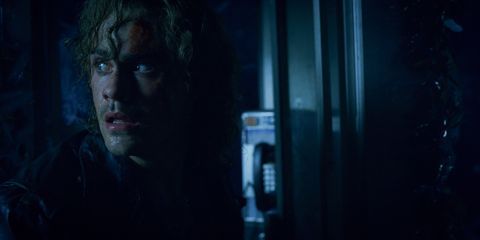
Then, in S4, we got some big surprises. The introduction of Henry, who has many parallels with Will, the huge reveal that the UD didn’t always look like that. And that is even stuck on the very day Will went missing. And not just when El opened the gate. But the exact moment Will vanished, at 8:15 pm.
We know that’s when the Demogorgon got him, because Karen told Mike he had to go to bed at fifteen after (eight) And when Joyce calls her the next morning, Karen tells her Will left just a little bit after eight. So, at 8:15 he was in the shed with the Demogorgon. And the UD being stuck at that moment is definitely important (also Will keeps have visions of the MF at 8:15 pm, even tho when he was filming Mike it was actually 8:04)

So.
The only way I could accept this coincidence is if they explain it as a parallel with Henry, who also happened to move to a town and into a house where the veil between our world and the UD is probably thinner. And that’s why he was able to sense the UD and draw the MF, and how his powers were activated. If that’s the explanation on how Henry’s powers were activated, because he moved into the only house where he could develop his hidden abilities, then, maybe, I can accept that Will was going home that night, and since the lab was near, he just met the Demogorgon. And then, when he arrived in the UD and had a direct contact with it, like Henry with the MF when he was a kid, his powers were activated too. But that’s the only coincidence I could accept, kinda. And I still prefer the idea that the Demogorgon followed him for a mile because it knew it had to get that kid. After all, there IS a big difference here. When Henry communicated with the MF there was no open gate. In 1983 there was, plus at that point Henry Creel was in the UD with the MF. So we’ll see...
But back to the it wasn’t a coincidence theory
To sum up: the kidnapping scene breaks the pattern of the Demogorgon attacks, suggesting that Will is not like the other victims. The Demogorgon being a bit too quiet, almost “delicate” with him. The door opened with telekinesis. The clue of the light in the shed getting brighter and not flickering, like the lights in the Creel House’s attic where Nancy and the others find Vecna. So they only broke the pattern with Will. And after S4 I believe that the vanishing of Will Byers was different because someone in the Upside Down wanted him specifically.

I think there have always been hints that Will has powers, but every time the writers gave us plausible explanations for the things he could do, like Truesight and the neck tingle: him surviving in the UD for a week in S1, and being possessed by the Mind Flayer in S2. Sure, it was strange that he’d managed to survive alone, for six days, in the Upside Down and that the Demogorgon didn’t kill him immediately. But with what we learned about Henry and the UD it all makes more sense...
Bonus:
S2 - Owens talking about the “virus” that was infecting Will (aka the Mind Flayer)
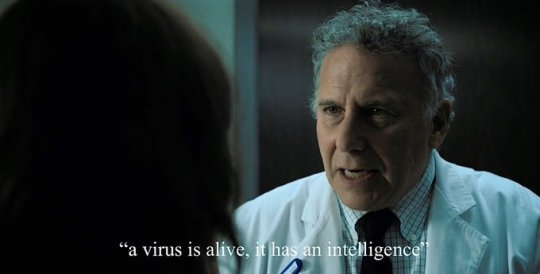
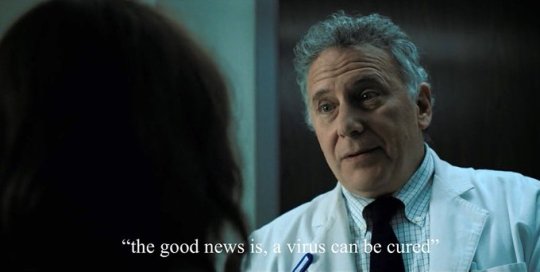
S4 - Here he was talking to El
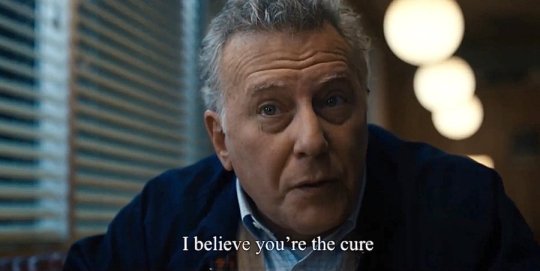
Hm, but at the very beginning of the season we have this. Look at the poster in Will’s room. What could it mean? It’s a mystery!

#will byers#will has powers#byler#st theory#st s5 spoilers#el hopper#henry creel#will and henry#st vecna#will and vecna#st s5#st s5 theory#stranger things theory#stranger things analysis#stranger things meta#the upside down#parallels#joyce byers#henry/vecna/001#st s4
324 notes
·
View notes
Note
HELLO MODS OF THINKING ABOUT MILGRAM ... what do you think about the new mv please infodump on me
Saturn's Thoughts - I love milgram so much for all their little details!!! Like at the very beginning we can know that the hand that flipped the hourglass was Mu's victim due to the shirt color?? (Admin Venus might start crying if you mention socks though) Also straight up, I want the worker bee dresses. They're so pretty?? And of course Admin Venus comes out with an immediate banger of a theory, Mercury has the most internet meme ever, and admin Neptune even came out of her hole to offer whatever the heck this is!!! And this shot?? Literally gives me goosebumps.
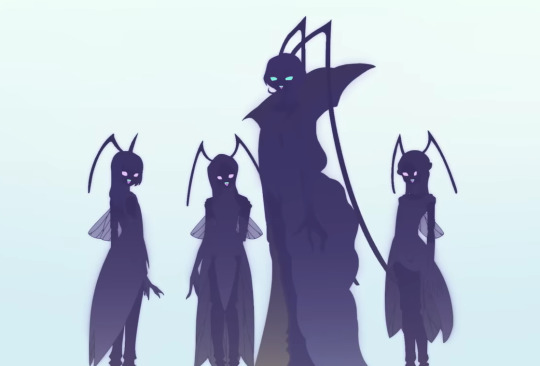
(Also congrats on finishing your finals Galacticus!!!)
Venus’ Thoughts - I’m not going to go too far into info dumping because I already did a whole initial takes post (as Saturn so kindly linked), but I will say that I really liked this MV! It’s deceptively complex; even though the fact that Mu was a bully in the past was technically “new information,” they knew that the fanbase would already know/expect that. So, while they tell that story, they bring in the bee/chrysalis/butterfly metaphors, the hourglass flipping back and forth, the lyrics which seem so self-obsessed but still fearful at times, and, of course, the parallels with After Pain. The song itself is a solid banger, too! Plus, even though it feels to me like the verdict should be a super obvious guilty, I’m not sure about doing it. Unlike the first video, where (in my opinion) Mu was the victim but lacked charisma/likability, I think that in this video, she’s clearly the bully, but she’s much more likable/rootable. She has that hint of self doubt; rather than painting herself as a victim who’s done absolutely nothing wrong, she paints herself as the villain who worries that that’s exactly what she is. That’s much more compelling to me, and I’m glad that they took this more aware path forward with her.
Neptune’s Thoughts - It’s bug time! First off Venus idk how you continue to come up with such banger initial thoughts posts considering how few braincells we had last night but pop off. Anyways, I really liked the whole bug/queen bee concept and the continuation of the hourglass metaphor. I was confused about why she ate the green stuff at first but it makes sense for it to be royal jelly. The parts that stood out to me the most were her causally shoving the servant bee to their death and how she quickly transitions from a look of “what did I just do” after stabbing the victim to a maniacal happy look.


Mercury’s Thoughts! - Hello loves! Mercury here with absolutely no comprehesable thoughts! Right when we were watching it at 2am, my brain first thought “Oh god not the Chimera Ant Arc AGAIN.” And then “lmao Queen Chrysalis looking ass” and finally “man Muu and Chloe Bourgeois are kinda similar lol.” OKOK onto actual thoughts! Muu’s frilly collar is absolutely supposed to look like a flower. TIME FOR MORE FLOWER ANALYSIS WOO!!! The closest one I can find is yellow hibiscus, specifically one that has the red veins like her collar. Like a lot of yellow flowers, yellow hibiscus represent friendship, joy and good luck. LMAO
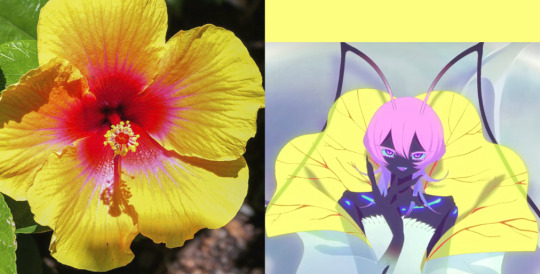
Another thing I noticed is after Muu “breaks” most of her servant bees, the three left are notably the ones with bright colored hair. By looking at their hair styles, they’re her friends from the picture in After Pain and the ones she was with on the rooftop in INMF. (kinda off topic, but all of Muu’s servant bees have small wings from the beginning, but Muu has a transformation at the end to get wings. Not exactly sure where I’m going with this tho??)
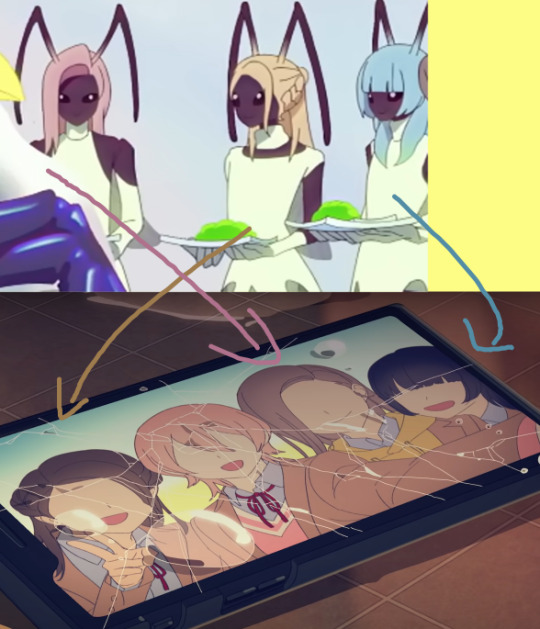
Finally, both Muu and Haruka similarly have a shot of their victim flash super quickly at the end. I don’t think that’s coincidental that the two characters that are notably together in Milgram have a similar shot in their MVs.
#milgram#ミルグラム#milgram muu#muu kusunoki#admin saturn#admin venus#admin neptune#admin mercury#pluto doesnt have anything else to add so shes not adding to this post lmao#thanks for the ask btw!!
52 notes
·
View notes
Text
After writing my post on The Three Students, I read The Picture of Dorian Gray, not because I mentioned it in the post but because I’ve always wanted to read it. I already knew about the sexually implications within it, since it’s usally the first thing people think of when the book is mentioned, but I honestly didn’t realise it was so explicit.
Because I’ve only read the book once, I’m not going to do an analysis on all of the ‘subtext’; it’s not my area and plenty of other people with greater knowledge have done it before.
However, one thing that I did notice was the strange ‘parallels’ between Sherlock and Watson with Dorian Gray and Lord Henry. I say parallels for lack of a better term, because I don’t actually see it as a mirror as such, or a foil either- I’m also not trying to suggest that ACD and Wilde wrote these stories with a huge masterplan to reflect each other (the other story being The Sign of the Four).
A bit of context, ACD and Wilde were both commissioned on 30th August 1889 by Lippincott’s monthly magazine to write a book. ACD wrote The Sign of the Four, published February 1890, and Wilde wrote The Picture of Dorian Gray, April 1891. These dates are going to be very significant.
The scene I am focusing most on in TSotF is the final scene (not the full scene though, just the last few paragraphs), where Watson is discussing his engagement to Mary Morstan to Sherlock.
“I [Watson] fear that it may be the last investigation in which I shall have the chance of studying your methods. Miss Morstan has done me the honor to accept me as a husband in prospective.” He [Sherlock] gave a most dismal groan. “I feared as much,” said he. “I really cannot congratulate you.” I was a little hurt. “Have you any reason to be dissatisfied with my choice?” I asked. “Not at all. I think she is one of the most charming young ladies I ever met, and might have been most useful in such work as we have been doing. She had a decided genius that way… But love is an emotional thing, and whatever is emotional is opposed to that true cold reason which I place above all things. I should never marry myself, lest I bias my judgment.” “I trust,” said I, laughing, “that my judgment may survive the ordeal. But you look weary.” “Yes, the reaction is already upon me. I shall be as limp as a rag for a week.” “Strange,” said I, “how terms of what in another man I should call laziness alternate with your fits of splendid energy and vigor.” “Yes,” he answered, “there are in me the makings of a very fine loafer and also of a pretty spry sort of fellow. I often think of those lines of old Goethe,— Schade, daß die Natur nur einen Mensch aus Dir schuf, Denn zum wurdigen Mann war ¨ und zum Schelmen der Stoff. … I remarked. “You have done all the work in this business. I get a wife out of it, Jones [detective] gets the credit, pray what remains for you?” “For me,” said Sherlock Holmes, “there still remains the cocaine-bottle.” And he stretched his long white hand up for it.
Ignoring how miserable it is for Sherlock to turn to drugs after Watson gets engaged (I know it’s difficult), but the translation of the ‘Old Goethe’ (German) is ‘It's a pity that nature only created a human being out of you, because the material was for a worthy man and for a rascal.’ This is important.
Now, the scene(s) in APoDG I am focusing on is Chapter 4, when Dorain Gray is talking about his relationship Sibyl Vane to Lord Henry, and when Gray, Henry and Basil (the artist) are discussing it in the beginning of Chapter 6. Both of these sections are too long to entirely quote here, but in Chapter 4, when Gray tells Henry of his relationship, Henry is disappointed because he thinks marriage turns a person selfish, therefore making them boring. He goes on into a philosophical rant about marriage and women, with plenty of misogynistic remarks of course, before Gray talks about how he met Vane. When Gray leaves, Henry again thinks about it all, then receives a telegram from Gray telling him he is engaged. In Chapter 6, again Henry goes into the morality of marriage and why he hates it so much, even though he is married. I’ve put a few important quotes in.
“Never marry at all, Dorian. Men marry because they are tired; women, because they are curious: both are disappointed.” “I don’t think I am likely to marry, Harry. I am too much in love. That is one of your aphorisms. I am putting it into practice, as I do everything that you say.” “Who are you in love with?” asked Lord Henry after a pause. “With an actress,” said Dorian Gray, blushing.
“My dear boy, no woman is a genius. Women are a decorative sex. They never have anything to say, but they say it charmingly. Women represent the triumph of matter over mind, just as men represent the triumph of mind over morals.” “Harry, how can you?” “My dear Dorian, it is quite true.”
“Your [Henry] voice and the voice of Sibyl Vane are two things that I [Gray] shall never forget. When I close my eyes, I hear them, and each of them says something different. I don’t know which to follow.
Lord Henry watched him with a subtle sense of pleasure.
“But do you approve of it, Harry?” asked the painter, walking up and down the room and biting his lip. “You can’t approve of it, possibly. It is some silly infatuation.” “I never approve, or disapprove, of anything now. It is an absurd attitude to take towards life.”
Personally, when I read TPoDG, I immediately thought of TSotF, because of these scenes. I don’t know if I’m thinking too much into this, but anyway, this won’t hurt anyone.
Dorian Gray’s and Lord Henry’s relationship is more explicit than Sherlock and Watson’s, clear by the stigma surrounding the story and the fact it needed to be pared down in order to be deemed ‘appropriate’ when it was originally published. Gray is heavily psychologically affected by Henry’s opinions and beliefs, leading to his demise. But, Henry has this strange infatuation about Gray, making it seem like a twisted romance.
On the other hand, Sherlock and Watson’s relationship is less ‘mental/emotional torture’ and more ‘love’, to simply put it. But, if we strip down the characters to what the audience’s image is, or the stereotype, and not the writer’s initial intent, they bear some sort of resemblance.
First we have the Sherlock-Lord Henry, the intelligent, cold, philosophical thinker, who is incredibly intimidating and has an overwhelming presence/influence. They are unusual, by both modern and Victorian standards, characters that people do not wish to be associated with.
Next, the Watson-Dorian Gray character, deemed the only character to be ‘acceptable’ to the one above. They are in awe of their respective companions, treating them like a god and obeying whatever they say (for Watson, think The Hounds of the Baskervilles; for Gray, the first quote above).
The difference between these relationships is that Lord Henry and Dorain Gray are so much more extreme. They are not right for each other, but they are drawn to each other. Lord Henry is obsessed with Gray, and Gray with Henry.
Sherlock and Watson are, again, drawn to each other, but they aren’t hurting each other. Sherlock has this admiration of Watson, and Watson is in awe of him, but they also recognise each other as human beings.
So, if they are different, why have I bothered writing this post for about an hour now?
What I am trying to suggest is that Wilde perhaps took some inspiration from TSotF and inserted it into TPoDG. Yes, I recognise that they were released not long from each other, but I don’t think it’s entirely impossible. Lord Henry seems like the evil, dark version of Sherlock Holmes, focusing mainly on his thinking rather than his character. I drew attention to the German quote that Sherlock said, ‘It's a pity that nature only created a human being out of you, because the material was for a worthy man and for a rascal.’ What he is saying here, after Watson tells him he is both energetic and lazy, is that he agrees, and humans have potential to be amazing or awful. From such a small-meaning comment of ‘you are amazingly lazy and hyperactive’ to talking about a person’s path in life, it really reflects the basis of Lord Henry’s personality; he turns even the smallest statement into a heated discussion about morality.
So, I might not be making any sense in this, but I do truly think there is some sort of link. Whether Wilde read TSotF and decided to base his characters on it, but making them extreme, will probably never be known. I might write a bit more on this because I do have some other ideas.
#Sherlock Holmes#sherlockholmes#acd holmes#acd canon#acd#sherlock meta#the picture of dorian gray#oscar wilde#wilde#The Sign of Four
94 notes
·
View notes
Text
Let’s See how Far We’ve Come
This post is purely self indulgent, but the newest pokemon op has been living rent free in my head for 2 days and I just had to jot down all my thoughts. There are SO many parallels and symbolism present to show how far Satoshi, Gou, and Koharu have come in the anime, based on direct comparisons in the past openings to the present. This is going to be a long post, so the full analysis is below the cut so as not to fill your dashes with an unescapable SatoGou ride.
Before we even begin, let’s get the obvious out of the way: Satoshi and Gou’s VAs are the ones singing the song. This is a deliberate choice that the directors/animators/crew want us to take notice of. They are the ones duetting and singing together - this is their OP, their story. As such, everything in this OP should be viewed as not just happening for our sakes as the audiences as an intro to the world and characters, it is Satoshi and Gou personally showing us how they view the world and each other. This is no longer a third-party’s view on our two protags, this is their viewpoint and perspective.
The opening starts off with the, now very iconic, scene of SatoGou standing with their pokemon on the grassy plains with the title card, but now even that has changed.

Almost immediately, the differences start. Before, the camera is simply climbing up the hill before landing on SatoGou with their starters. Now, The camera follows a Pidgey as it flies by all their current companions at the Sakuragi Lab. This presents us with a metaphor that, where OP1 was a gentle ascent, in the current OP, the boys and Koharu are soaring towards their dreams fast, much like the Pidgey.
Cute first clue that the boys have gotten closer: as it lands on SatoGou, both of the boys and their pokemon get literally closer, before the title card moves past them onto Vermillion City, where before the camera would simply linger on the both of them standing to the vast blue yonder.
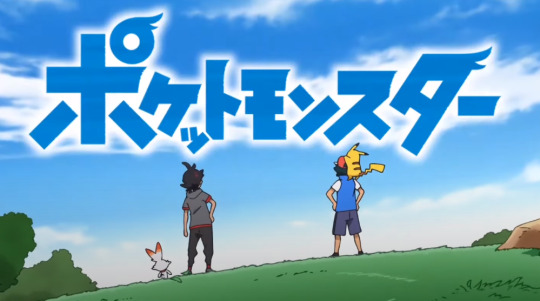

Speaking of which, I always found it interesting that Gou and Co. are from Vermillion to begin with. It could have been any city, not even in Kanto, but it’s deliberately Vermillion. While it may not mean anything: Vermillion is a deep red color, matching with Gou’s design, and symbolizes life and eternity. I wonder if maybe this is a nod that Satoshi has found his forever traveling partner, whether we view this as romantic or platonic is neither here nor there, and it is the anime director’s way of saying “hey, this is our final form of the show” and maybe another hint that this will be Satoshi’s last journey - if Journey’s ever ends, it will follow a new protag or the anime finishes completely and only does yearly OVA’s to promote the games/merch. Food for thought.
Continuing on:
In the first opening, the boys are shown separately, doing their own thing in the present - Satoshi playing with Pikachu, Gou packing with Scorbunny

The new opening instead chooses to spend this moment reflecting on SatoGou’s past - Satoshi first meeting Pikachu and Gou first encountering Mew -
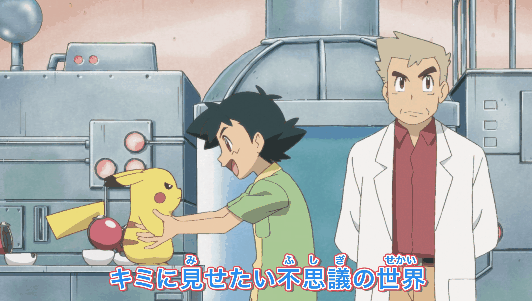
Both of these moments in time being what led them on to their current path. A path that, wouldn’t you know it?
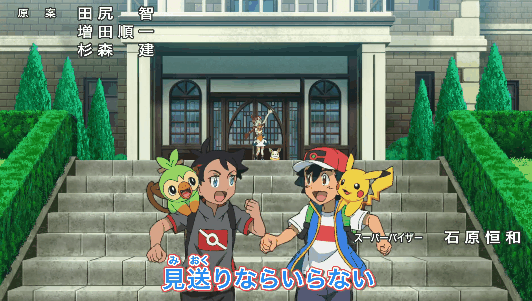
Leads to them meeting each other and their current adventure.
Also, let’s go back and focus on Koharu back there for a second too, because she has changed a lot even just in these few moments.
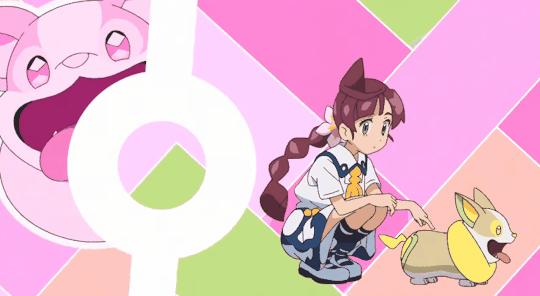
In the first OP, Koharu is distant from the gang, almost cold and impassionate, even just kinda poking at Yamper who, even tho she likes, she keeps at a distance.
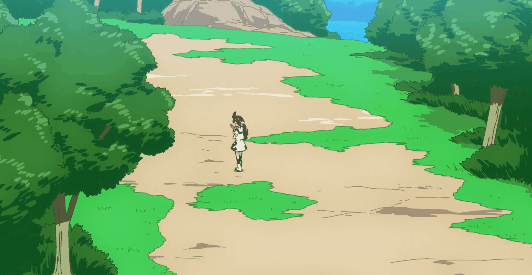
In this OP, Koharu has found her passion for pokemon, Eevee being a big factor, present in every shot Koharu is in. She waves to the boys as they leave, finally understanding and supporting them, as well as traveling with them to go visit Hikari, the Sato to her Gou. I think it’s wonderful to compare her start and finish and see how much she has grown thanks to everyone she’s met.
Let’s go back to SatoGou now, looking at the iconic paper cutouts and how they’ve changed:

While SatoGou are definitely alongside one another, they are still cutout separately with different reactions to something happening. Meanwhile in the current OP:

SatoGou are cut out from the same sheet of paper, now interacting with one another and side by side. They are no longer two research buddies who happen to travel together, they are two friends on the same journey together, even if they have different goals. Speaking of which, this might blow your mind (I know it did mine once I noticed):

In OP1, Gou is reaching toward Mew, his goal, then opens his eyes to which Satoshi then joins him, literally appearing in his life and taking him by surprise. This really shows how happy Gou is to find someone who is standing beside him and supporting him on this journey, someone who get’s his goal and doesn’t laugh or scoff at it. I think this is one of the reasons the ship name of “firstfriendshipping” still feels so right for the two even though Gou has always had Koharu. Yes, he cares about and likes being around her, but he’s never had a true companion who really gets him. Satoshi does though, and in that way, he’s his first real “friend”. Despite having a friend beside him though, Gou’s goal is this this unattainable Mew and it is his goal alone. In the newest OP however?

First off, I just really love the cinematography of this, but more importantly, the symbolism is off the charts here.
Where before Gou is standing alone before Satoshi appears into his life, Gou is now alongside his three Galar pokemon. They don’t just appear beside him like Satoshi, they are right behind him, pushing him forward to be able to reach that star in the sky - another interesting change in this OP btw: Mew is not a Sun, so far and shining so bright that it’s unreachable. Mew is now a little star that pops up off of a Pokeball, one of the very stars that appears every time he makes a nice catch. And, even more interesting, is that transition to Satoshi that every SatoGou fan took notice of immediately.
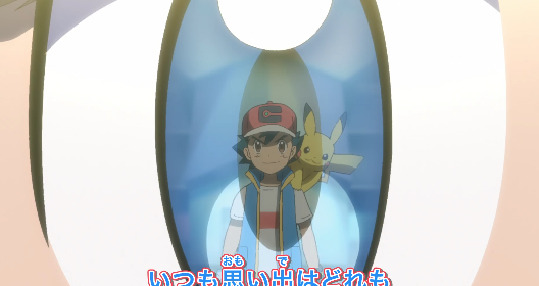
I just want to kind of linger on this frame and compare it to another OP for one second - OP 2, in particular.
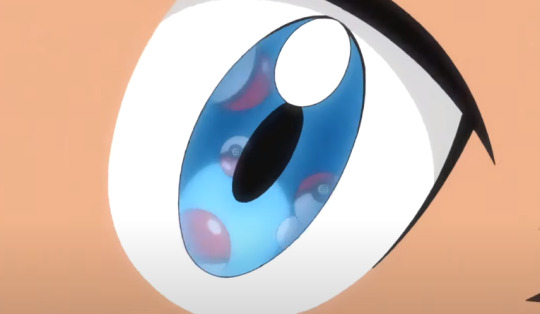
In OP 2, we get this shot of Gou, his eyes reflecting his goal of catching every pokemon on his way to Mew. I find this so SO intentional on the part of the animators to compare these two shots and what they mean. Yes, the transition from Gou to Satoshi through a zoom in on Gou’s eyes is, of course, just straight up cool. It’s a good transition - smooth, sleek, and eye-catching. But it’s also just way too symbolic for no reason. What’s reflected in the character’s eyes during OPs are always meaningful, such as in the shot above from OP2 and also a similar shot with Koharu and Eevee in OP3
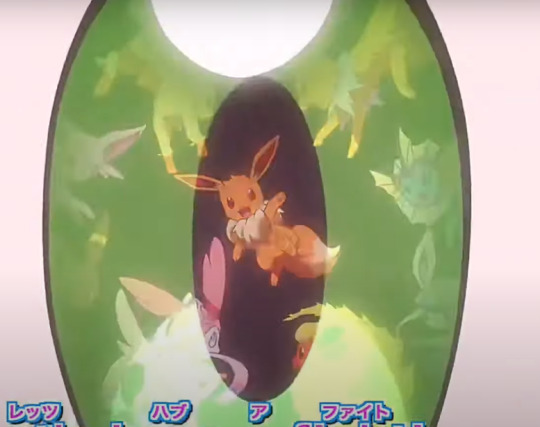
We know, it means a lot to have something reflected in your eyes. So, what can we infer it means that neither Mew nor Pokemon is reflected in Gou’s eyes in the newest OP but instead Satoshi? I think it’s pretty self-explanatory, tbh. Gou’s dream, his goal, is no longer just to catch Mew - he wants to see Satoshi reach his own goal one day, to be in a stadium competing and wining the championship, becoming a Pokemon Master. Satoshi, in this way, is Gou’s new dream.
Satoshi, meanwhile, has also grown a lot. We all know that Satoshi has tons and tons of Pokemon, so I find it interesting that OP1 takes a staunch approach at only showing Satoshi with Pikachu, not even hinting at what pokemon he might catch in the future of the show like Farfetch’d and hatching Riolu. In every other Pokemon OP before Journeys, Satoshi is shown with the rest of his team, expanding more and more until he reaches his full party. In OP1 tho, Satoshi only has Pikachu, symbolizing and pointing out how Satoshi always “restarts” his adventure with just Pikachu when he goes to a new region. How has this changed in the newest OP tho?
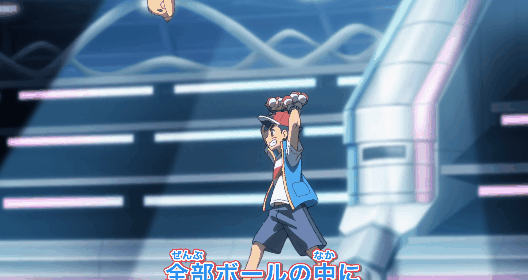
Not only does Satoshi have his full team, he also still has his pokemon from before, his Greninja,

his Alola team, and probably we’ll even see the others one day, considering how many other old companions and regions are coming back. Which brings me onto my next point -

We really have some of the greatest hits here, huh? Satoshi no longer has a single region - a single friendgroup or rival - influencing his dreams anymore. Satoshi has had and made many rivals and friends through his journeys and OP4 acknowledges this. We aren’t forgetting anything about where Satoshi has come from or how much he’s grown. All his past journeys have accumulated to make him into the person he is today:
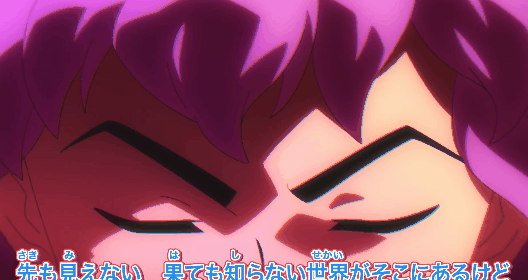
The person who will take on Dande and who is traveling alongside Gou.
What a wonderful OP. Every frame is so well considered and symbolic, I appreciate it so much. I hope my super long breakdown and comparison of it made you appreciate it slightly more now too.
83 notes
·
View notes
Note
I sometimes think the real reason RWBY gets treated so poorly has to do with the fact that it's a web series that aspires to be more than the typical web series of the time, especially given when it originally started and the types of web series that existed at the time.
Off the top of my head, a lot of animated web series around the mid 2000s to mid 2010s tended to lean heavily towards crude humor, "ironic" bigotry and various "isms" that were casually accepted, sincerity was rarely accepted or was treated with mockery, or such series were just only seen as nonsensical internet lowbrow humor.
Basically, a dude bro boys club sort of environment, and where stories that were more sincere (like Super Mario Bros Z) never dared to tread into areas that could offend the kinds of people who were around in this environment (especially in regards to anything that could be considered politically left wing, or even just simply leaned outside of the dudebro culture), and usually stuck to a straightforward "save the world" escapism or something relatively simple and inoffensive.
And then you have RWBY, which seemingly starts out with a bunch of easy anime waifu stereotypes in a magical school for killing monsters that slowly evolved or revealed themselves to be far more than that, with side characters doing the same, but still being in that "safe", "cutesy/hot waifu" area that didn't offend anyone.
And then Volume 3 happened, and everything changed.
Suddenly those 2D stereotypes started to show uglier, more real aspects to their characters that didn't neatly fit into easy to swallow pop culture cliches and expectations of what a multi-dimensional character should be (ie easy, safe, and keeping the status quo). Suddenly you had the dude bros and the ideals they idolized being inspected and scrutinized in the story and on a metal level, as well as actively questioning a lot of the typically accepted anime and internet stereotypes and tropes that people online expect and would only accept. And it does all of this while telling a complex story with a lot of direct and often-times uncomfortable parallels to our increasingly torn real world on a relatively miniscule budget, while juggling a fairly hefty cast of increasingly complicated characters.
This isn't to say they did everything right, but I can imagine this would be immensely uncomfortable, given the internet is filled with people who can barely figure out how to critically analyze straightforward sentences or 2 minute long monologues that tell them exactly what's going on, let alone their own biases in regards to storytelling, or their own beliefs, ESPECIALLY in regards to anything that they deem even remotely "political". And with the easily disposable way we can treat media, many people likely can't even be bothered to do any in-depth analysis of a story to begin with or only bases their analysis on their deeply held stereotypes and cliches, something that really weakens their ability to "get" RWBY, which often needs to be re-watched just to really notice the details.
To cap things off, a lot of the people online have only developed (or perhaps "revealed" would be more accurate to say) a disturbingly strong sense of entitlement and impatience. For example, Super Mario Bros Z? The OG series got canceled because the series' fans kept pestering the creator to the point he got sick of it and lost motivation to keep going, taking years before he started the reboot again.
That kind of person in addition to everything else I've said above? It becomes far less surprising that they'd be put off by this scrappy little show that's somehow managed to be ridiculously popular. Especially since it has so many aspects that actively pokes and prods the things that they've held as online web series gospel, things that "just are" the status quo and that they "deserve" to have their say in any show they were fans of or hated.
Is it any wonder that the vitriol is so intense?
You know what? That actually explains a LOT, thank you.
152 notes
·
View notes
Text
My next music analysis involves a parallel between BCS 5x08: Bagman and BCS 6x03: Rock and Hard Place as well as a small parallel between BCS and BrBa.
The cue in the Bagman scene is titled “Target.” This is the scene where Jimmy and Mike work together to take down the cartel member that has been hunting them down in the desert. The Rock and Hard Place cue has the same title as the episode, and it occurs when Nacho is riding out to the desert to cover for Gus as he faces the Salamancas.
My analysis is under the cut!
bcs/brba music analysis 4/??



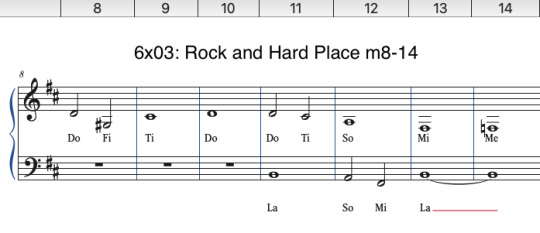
“Target” has a tonal center of F# and “RaHP” has a tonal center of D. I’m reluctant to say that either cue is “major” or “minor” because both have high amounts of chromaticism, so I’m just gonna stick with tonal/pitch centers. (It’s also worth noting “Target” ends with a tonal center of D, as seen below.)

The melodic content of both cues are very similar, and at times even identical. The rhythms are certainly identical (half note, half note, whole note). Using solfege (another way to denote scale degrees) you can see that both cues also contain a distinct, recurring motif of a descending half step followed by a descending leap: Do, Ti, So; Do, Ti, Mi; etc.
(I didn’t include the entire transcription for each cue here for you to see because I can’t put that many images in one post lmao but you should be able to easily hear the next part of my analysis if you listen!)
The cue begins with a thin texture, just the half-step motif with some single notes in the bass to harmonize it, creating a sense of introspection. As each cue develops, the texture thickens—both in harmonic and rhythmic content—and the contemplative nature of the motif changes into something more urgent and intense (this is especially noticeable in the “Target” cue.) This change from introspection to urgency supports the narrative for each episode as both Nacho and Jimmy make a choice for someone they love.
In “Bagman” Jimmy resolves to not give up and die in the desert—to keep fighting to survive for Kim. He and Mike can’t keep hiding forever, so he makes himself a shining target with the space blanket to lure in the cartel member close enough for Mike to snipe him. The music builds and builds in intensity until Mike finally shoots the bad guy. In “Rock and Hard Place” Nacho has chosen to take the blame for Lalo’s death to save his father, and he is coming to terms with his impending death. The music swells as the van drives closer toward the Salamancas and reaches its climax as Nacho is dropped in front of the Salamancas.
There is also a small parallel between “RaHP” and the BrBa Theme!! The minor third motif at the beginning of the BrBa theme occurs a few times underneath the main melody in “RaHP”. The rhythm is augmented and slightly different, but it can still be heard as the BrBa Theme.
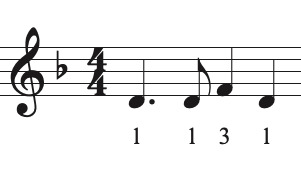

Maybe it’s a stretch, but to me the BrBa theme being associated with Nacho in this moment shows how Nacho’s story colors the events of BrBa even though he’s not there.
Anyway…that’s my analysis! I hope you all enjoyed it and found it interesting. Let me know what you think!
25 notes
·
View notes
Text
The ship disses in s3 are really something else. And I still laugh to myself about it XD
Disclaimer : the ships you like being paralleled to say lonnie/Joyce etc. Doesn't mean I'm saying that ship (or the characters in it) are as toxic /as bad as that paring or say Lonnie. It's just a hint the ship is prob not endgame or not super healthy. Lol let's begin, this is just me listing stuff I noticed (not a super in depth analysis)like my other posts.Also probably don't read if you like the obvious st ships ...
S3 being advertised as "summer of love" a term for romances that don't last.
M*leven
The fact the duffers wrote stuff in the s3 script having people say m*leven is "gross, bullshit, and unhealthy" . Or Mike saying "El sorry,not interested" on the phone.Dustin pointing a object called the 'slammer" (aka slang for prison) at Mike -as El clings to him. Having Mike wear the same outfits as his parents who aren't in love when dating el in s3, as he compares dating her to what adults (like his parents do). And 1 of the parents he's mimicking is also secretly into a dude named William, instead of their romantic partner.
El/Steve asking if Nancy/Mike "remember" the things they said about their 1st relationships. Both claim they "don't remember". And el and Steve claim that Nancy/Mike love them because they said so in the past . But both don't respond and can't say I love you a 2nd time. Cough cause they both were lying about loving them.
Alexi says strawberry slurpee is "shit" compared to cherry. El- goes to Max's house on cherry road and Max says El should dump Mike . And as Max gives el a strawberry icecream she dumps Mike (cause as Dustin said m*leven is " bullshit"). Yes!
Mike claiming m*leven is on "just a break". And Max/ Will disagreeing saying its over . El knocking out all the candy except the one mike wanted the kit kat (slogan: having a break? Have a kit kat). Aka not a break so no kitkat for Mike XD
In s3 Dustin says him and his gf are like star-crossed lovers like romeo and juliet. Similar to the term "summer love" , 'star-crossed " meant the relationship doesn't last. And it was a hint to the audience of the play the pairing wouldn't end up together . Some people say this also applied to m*leven since they were out of frame during this line by Dustin, and right after Dustin says this they try ditching the group, to kiss. Also: shakespeare didn't believe in "love at first sight" similar to m*leven - infact every play where he had this trope it ended horribly for the pairing . He actually believed in the trope of realizing you're in love with someone you've known for a long time after a great separation. Hmmm.
Will to Mike as El ignores him "welcome to my world". Cough s2 lucas saying about he-man and barbie: "they're not in love they're not even from the same planet". Cue El in s1 watching he-man and s1 her being compared to et (who like el) dresses in a barbie-essque disguise. Then lucas in s2 says he-man kissing the barbie doesn't mean they're in love- and Dustin in s2 also has a he-man next to an et (to make the parallel to m*leven more apparent).Also- lucas says the 2 figurines kissing aren't in love ... and the scene right before that was j*ncy kissing for the first time- suspish.
J*ncy (+lum*x & m*leven)
j*ncy (like s3 m*leven) is also called "gross" by Will in s3. And in s3, Nancy says to jonathan:"I guess we just don't understand eachother anymore ". A similar line jonathan says to nancy- about his parents’ relationship, in s1. "I guess, they loved eachother.(I just wasn't around for that part)." Or In s1, Nancy says to jonathan, his excuse for taking her pic was "such bullshit".similar to m*leven and stancy being called "bullshit" which in s2 meant Nancy didn't love Steve . In s1 she even said sl**ping with Steve was "bushit" as foreshadowing for s2. (and m*leven/st*ncy are similar to j*ncy, because they were compared to a different dysfunctional parental romance: karen/ted + lonnie/joyce). We also have Murray in s2 saying about j*ncy “cut the bullshit- and share the damn bed.”
Also Dustin calls m*leven in s3 "bullshit". But in s2 when him and Lucas are playing a videogame fighting over princess daphne(max) and Lucas wins - Dustin says the game is "bullshit" too.
J*pper (+j*ncy/m*leven)
Not to mention Murray says in s3 that hopper must remind joyce of a past "bad relationship " (Lonnie). Cough both saying she's "on the edge" in s1. Both making fun of her for her obsession with lights vs magnets. Murray also says " cut the horseshit." (Which is closely related to the "cut the bullshit" line). Also j*ncy and j*pper yelling in the car as both relationships are compared to joyce/lonnie. I wouldn't say either ship or characters are as bad as lonnie though
Also,in the same s3 episode, hopper and billy ask joyce/karen out ( both are stood up). Hopper orders 2 glasses of red cherry chianti as joyce stands him up. Joyce after hopper asks her out thinks of how she shared 2 glasses of red wine with Bob (on the sofa) . And hopper drinks the wine alone on his laz-e boy when stood up. Similar to karen after Billy asks her out, sadly looks at ted sleeping on the laz-eboy and regrets being with him,in s3. Lyrics playing as she looks at ted there: "I should have walked away". Also in s1, el is into ted's laz-eboy and Mike compares her to ted saying "that's where my dad sleeps want to try it?" Hinting at his later emulation of ted/Karen's relationship , when dating el .we also see in a1 nancy observe her father sleeping on the laze-boy, then sit and cuddle with steve on the couch. In s3, Karen whose trapped with ted finds j*pper odd ,but oblivious ted ships them together . Murray says j*pper should jump in the "SACK" similar to karen/ted who settled in the "cul-de-SAC." Murray says this in the car. In the car is where j*ncy is compared to lonnie/Joyce via the " i guess we just don't understand eachother" line vs "I guess they loved eachother " line . Both s3 car fights of j*pper/j*ncy have them compared to questionable dynamics (karen/ted) & (Joyce/lonnie) via callbacks to the lines nancy and jonathan mention about their parents not loving eachother (when both were shooting cans together in s1). And ironically, after this s1 scene, jonathan says nancy being with Steve will have her end up in a miserable relationship exactly like her parents (which has some truth to it - since similarly steve/nancy was also paralleled to ted/karen in a myriad of ways). But j*ncy also parallels Jonathan's parents, similar to stancy's paralleling Nancy's parents.
Also, during the scene where joyce is thinking of Bob, and drinking red wine,she is watching cheers where the character Dianne says "he (fraiser/hopper) ordered chianti and asked me to marry him". Dianna left Frasier at the alter because he was a rebound. And later hopper is grumpy when alexi/Joyce mention Alexi's preference for cherry. And hopper claims strawberry "j*pper " is the same as cherry (boyce). Its not . We also had when hopper ask joyce out there is a radio shack sign behind him- showing where her mind is. After she stands up hopper - she even drops a heart magnet at Hopper's, as part of her explanation for doing so : earlier the magnet holding Bob (her heart) falls . Her obsession with magnets is symbolically part of her mourning Bob too...
All the ships
A j*pper moment being interrupted by Hopper puking in a bucket in Joyce's lap. Or max saying the boys are probably heartbroken and crying over the breakups. And INSTEAD we have Mike and Lucas laughing and farting/ burping. Will also says all M*leven do is "swap spit". Lucas - spits in bottle and offers it to Max. She looks disgusted and walks away.Wow the duffers take these relationships very seriously...not like they called some of these relationships "gross/bullshit" or anything.
max says to El should dress in a way that feels like her- not her parent or boyfriend. Lucas dresses like karate kid because he knows max (his gf) has a crush on him. Hopper tries dressing like magnum pi- which doesn't impress her. Steve takes off hat to impress girls- doesn't work.According to the clothing designers nancy dressed like the girls from "new age music videos' cause jonathan is into it (instead of her usual preppy attire). Mike in s3 mirroring the loveless dynamic of his parents so he dressing like them. joyce in s3 wears the same shirt- that in s1 jonathan wears. This shirt is worn when jonathan overhears his parents fighting on the phone (in a flashback). And Proceeds to do the same thing with nancy in s3- and have his relationship compared to his parents(lonnie/joyce). Joyce wearing same shirt looks longingly at pic of bob/thinks of him when wearing the shirt (after Hopper asked her out). Has her dynamic with hopper also compared to lonnie/Joyce, as Murray says she may want a "nice guy" (bob) but is curious how Hopper is in the "sac "(aka bed). Murray suggest both pairings sl**p together despite their issues/ "quaraling" - awful advice Murray . Not saying any of these characters are bad as lonnie or neil. Nor are the ships are as bad as lonnie/Joyce or neil/ex wife. But still ... not a great parallel if we're thinking about these ships' futures XD
Nancy in s1 says Steve is "crazy" and an "idiot "(stupid) for her . In s2 he begs for her to be "stupid" with him at the party. Nancy says the relationship is bs, after throwing the word "stupid" back at him at the party. Max in s2 says lucas is "crazy" , and Dustin says as lucas spies on Max he's "stupid". Then in s3, max and El say there's "more to life than stupid boys". And all of s3 when criticizing m*leven they say "el's not stupid."Steve and Mike confess to robin/el using the words "crazy and stupid". But similar to the other gals- Robin says she wasn’t into Steve’s ‘stupid hair’/ El says “what makes you crazy? Nancy in s3 is even called "crazy and stupid" for wanting to pursue the news story in s3. And jonathan doesn't care about the story like she does and says it’d be “stupid’ to get fired over it. While Tom fires her ,he says she's "crazy" for doing what she did .flo: Only love makes you that crazy and that damn stupid”. Aka Nancy's true love is journalism not steve/jonathan. And max, robin, el, and Nancy don't actually romantically "love" the boys they're usually shipped with.
Not even getting into how the 2 different songs playing during the stobin confession/rejection play during the j*ncy and m*leven goodbyes at the end of s3. And that's suspisous for alot of reasons . since robin rejecting Steve in the bathroom also parallels nancy (in the bathroom) saying she doesn't love Steve (by saying the relationship was "bullshit"). Stancy's first s1 onscreen kiss was also in a bathroom, and dustin in s3 interrupted both the bathroom stobin rejection/m*leven confession, and also the s1 almost kiss between m*leven ( which was also in a bathroom). Hmm.
Mike in s3 about el spying on him : whats if I was in the bathroom taking a massive shit? Max : well ,then gross. (LOL like how in 1 scene , in s3,they called m*levn bullshit and also in s3 m*leven/j*ncy gross. Haha, Max and Will both agree about m*leven being gross too XD). Also Steve and robin barf in the bathroom, and then Steve is romantically rejected there- is that a parallel to a j*pper moment being cut off due to Hopper barfing ? The duffers really compared "canon" relationships in their show with (gross) shit, burps, spit, and vomit... bro.
Lying & st#lking: Neil (in s3) yells at ex wife “stop lying to me .” her : i’m not lying to you. Mirrors how Joyce in s1 says to Lonnie (her ex) “don’t you lie to me.” him: ‘I’m not lying to you’. El in s3 dumps Mike for lying to her (and even when caught in a lie ,he tries to lie to her and falsely claim he's telling the truth about nana). And when (in s3) El says "but friends don't lie?" Max says “boyfriends lie all the time”. In reference to s2 when Max called out Lucas for lying , right after he claims “friends don’t lie’. Both max/Joyce shove a paper into lucas/lonnie's chest to prove they were lying. The first j*ncy kiss has the song "the first lie" play over it as well,cause they lied to eachother right before they kissed. In s3 robin tells Steve after being romantically rejected by a girl "crazy idea ever think of telling the truth." Later in s3 he spies on this same girl he lied to with binoculars (similar to s2 lucas lying/spying on max with binoculars). Cough spying or lying to a love interest isn't "crazy" (love) ya'll.
The lying of l*max , m*even, j*ncy. The st*lking aspects of j*ncy, m*leven , and l*max.Mike being angry at El for spying. literally in s2 l*max and m*leven dance to a song about st*lking an ex. And at the same dance jonathan and nancy look at eachother. El in s2 watches soap opera where the couple breaks up, and later on the ex st*lks the other.
Lonnie ignoring Joyce's calls- and him and joyce arguing on the phone , and Lonnie disconnecting his phone to not answer . Similar to (in s3) jonathan/max saying at the phone 'shut up" as lucas/nancy call. And in s3 nancy/jonathan arguing while talking on the phone. Joyce in s3 on the phone, and Hopper and her start yelling at eachother (while she's on the line with someonelse). El not answering Mike calling for 353 days. Jonathan being angry in s3 Nancy didn't call him about an emergency that could relate to Will (similar to his anger at lonnie in s1 for not calling joyce back- about a Will related emergency). Hopper after being stoodup says to joyce "no phone call? No apology? You've outdone yourself." Mike blaming el for the breakup , and never bothering to call her on the phone to apologize right away- even when lucas suggested they should call them .Mike lying to el and hanging up on her . Mike saying on the phone "el? Sorry not interested... telemarketers". Mike in s2 when calling her on walkie talkie, hangs up as El tries touching his cheek as she (wrongly) spies on him
L*max, m*leven, and j*ncy , and j*pper being called "bull/horse shit". And m*leven and j*ncy being called "gross ".
Like... I'm pretty sure the duffers don't ship this stuff lmao. They are so petty and honestly pretty harsh. It is unreal... truly XD
There's way more from prior seasons ...but lol there's just too much . M*leven being compared to a ghost vs ghost hunter? While byler is venkman/Dana. M*leven being compared to Et and Eliot? And worse of all siblings XD
Mike in s1 tries asking El to snowball, as El wears his sister's dress.And El ask if Mike will they'll go to the snowball as "friends " or if Mike will be "like (her) brother". Right before Mike kisses her. Cue in s2 them being compared to siblings luke/leia (who kissed in the past). Mike(leia) saying "its a trap" to El(luke). Meanwhile in s1, byler is compared to leia/han. At the snowball: Dustin and Mike sit/mope to themselves after both were sadly staring at the couplets of max/lucas & Will/girl dancing. Then, Nancy (Mike's sis) dances and teaches Dustin how to dance. And, Mike similarly, teaches El how to dance. Cause those dances were familial not romantic...
Plus that whole song-door thing in s3. Will in s3e1 says (unconvincing) he won't fall in love and the lyrics being played in the scene were "love that's new to you. You open up the door." At the end of s3, Mike not kissing or responding to El's love proclamation is in Will's room (as mike is infront of Will's open closet door).
Besides the open 'closet' being a metaphor for COMING OUT. And Will's open 'closet' literally being in the frame of the one sided m*leven kiss. In s1- Mike literally closes his closet door as El is inside, as he and Karen talk about his feelings for Will. The s3 timeskip , with the open closet door: indicates Mike doesn't want to use El anymore to keep his closet door closed (aka to hide his feelings for Will/ pretend to be straight with El ,anymore). In s3 e1: same ep with Will's love/open door song. M*leven kisses with 2 songs - 1st one "just a little more time (s3 time skip) can open closing doors (Will's door)." And the other song they kiss to is 'can't fight this feeling" : its about hiding the fact you're in love with your friend of many years and being afraid to admit said feelings to them. Opposite of m*leven who kissed after a week and are already dating . Lyrics : " what started of has friendship has grown stronger, if only i had the strength to let it show. Even as i wander (dating El) im keeping you in sight. if i have to crawl upon the floor come crashing through your (Will's) door, baby i can't fight this feeling anymore. " it literally matches how Will's song says "love you open up the door". Meanwhile when El dumps Mike the song cold as ice plays "You're closing the door,you leave."
#mike wheeler#el hopper#byler#nancy wheeler#jonathan byers#max mayfield#lucas sinclair#dustin henderson#steve harrington#robin buckley#stranger things#jim hopper#joyce byers
122 notes
·
View notes